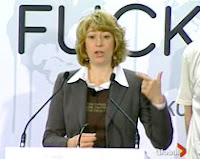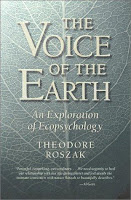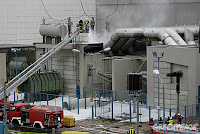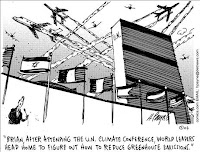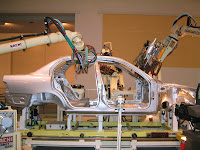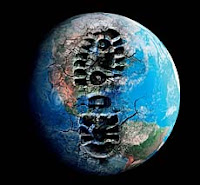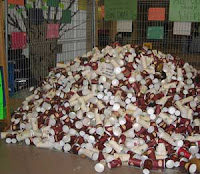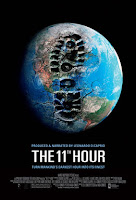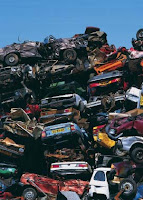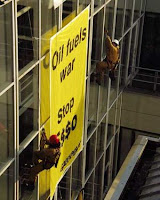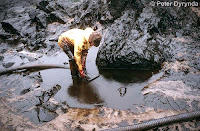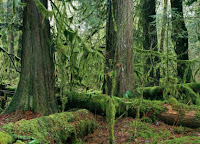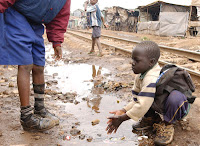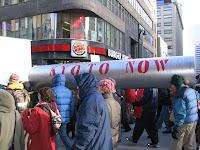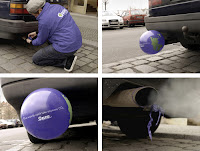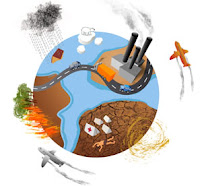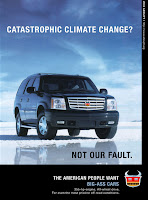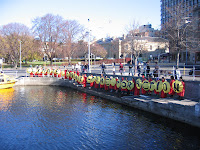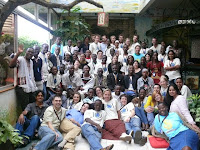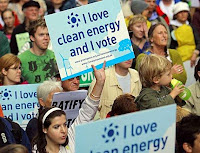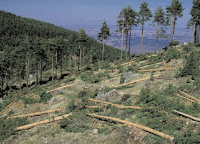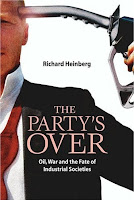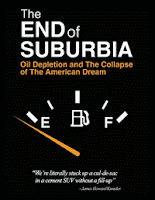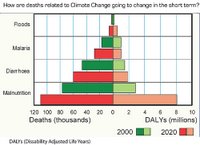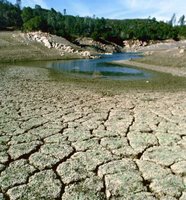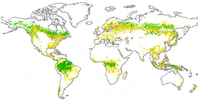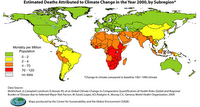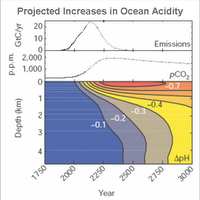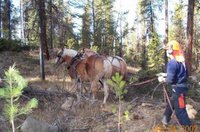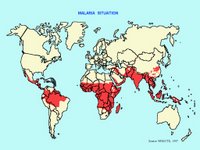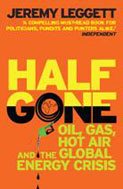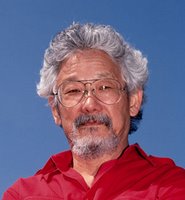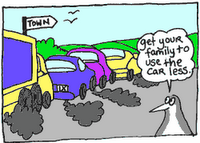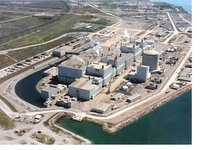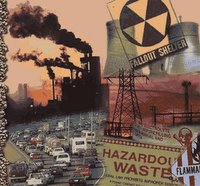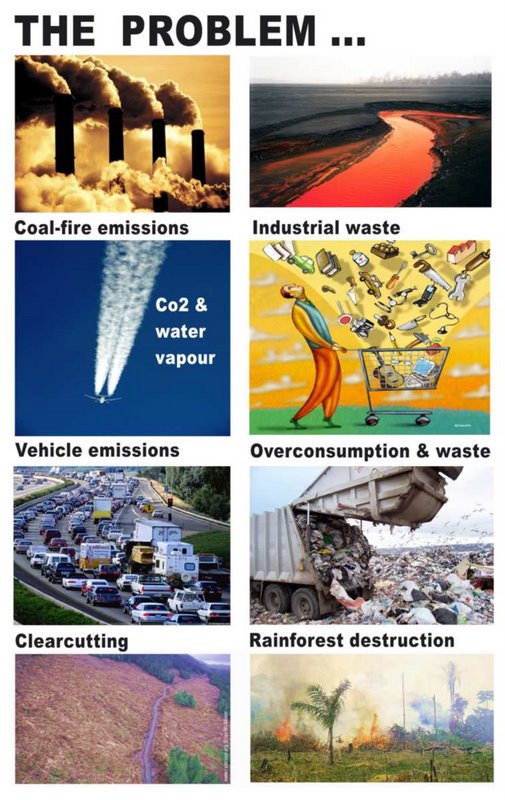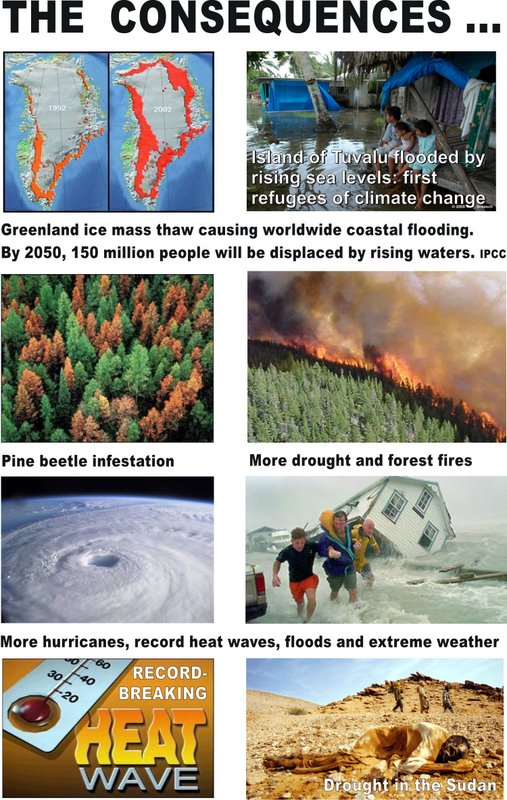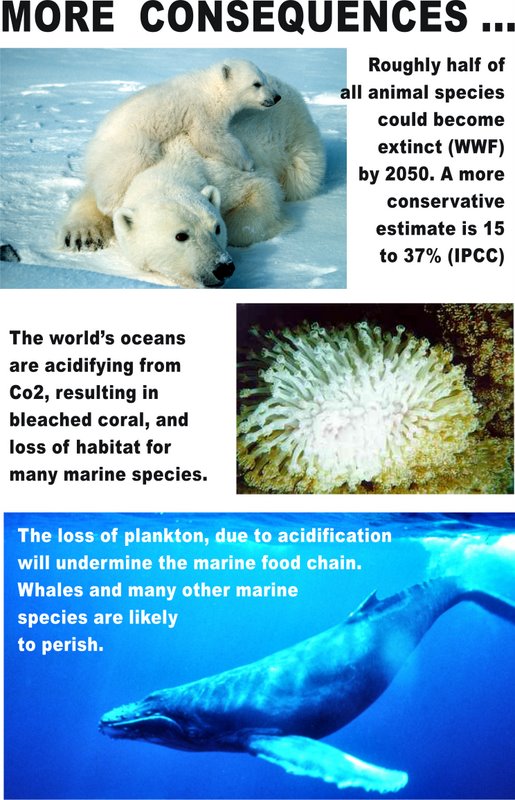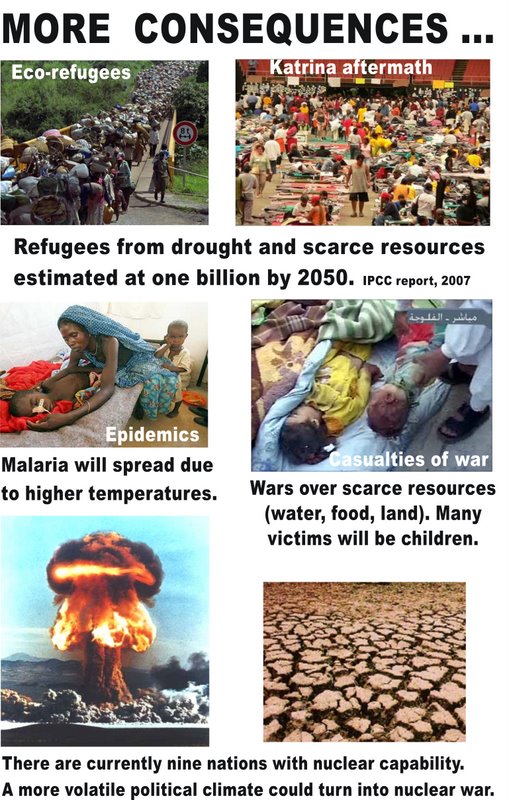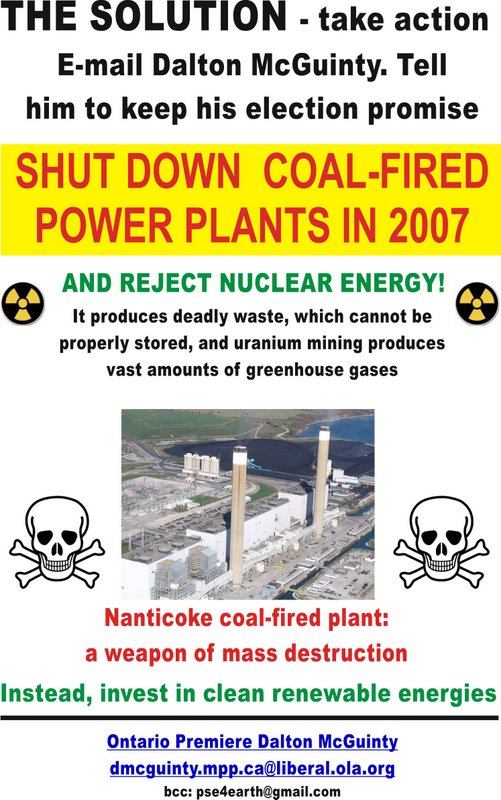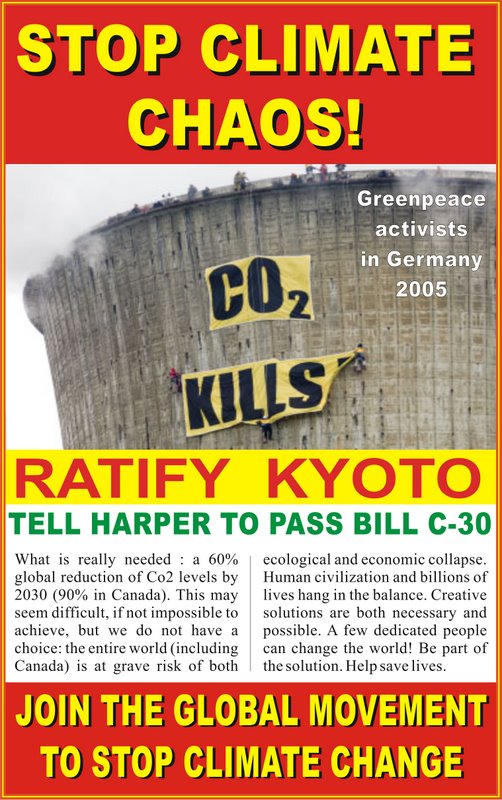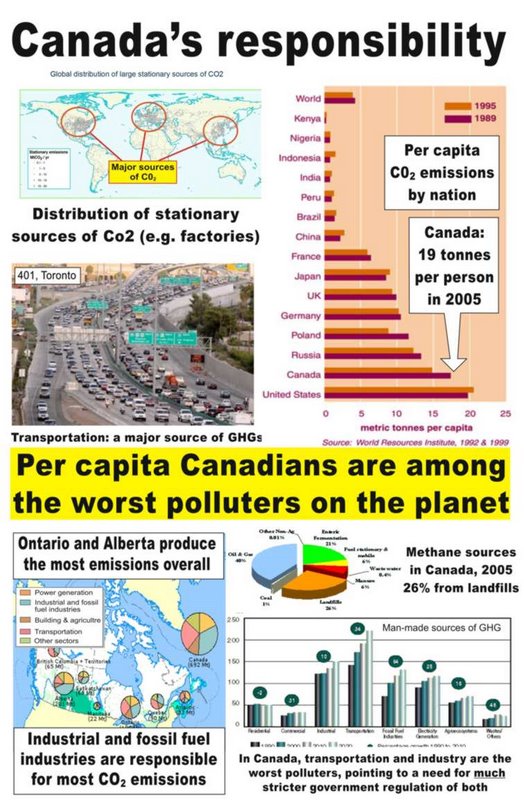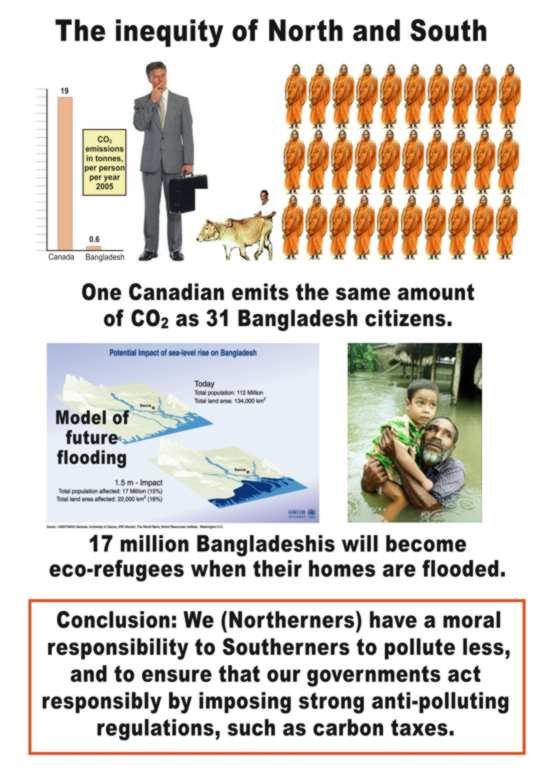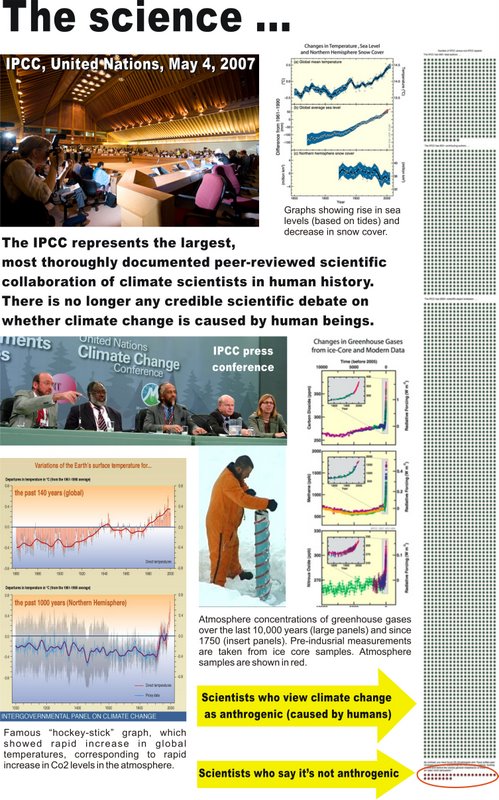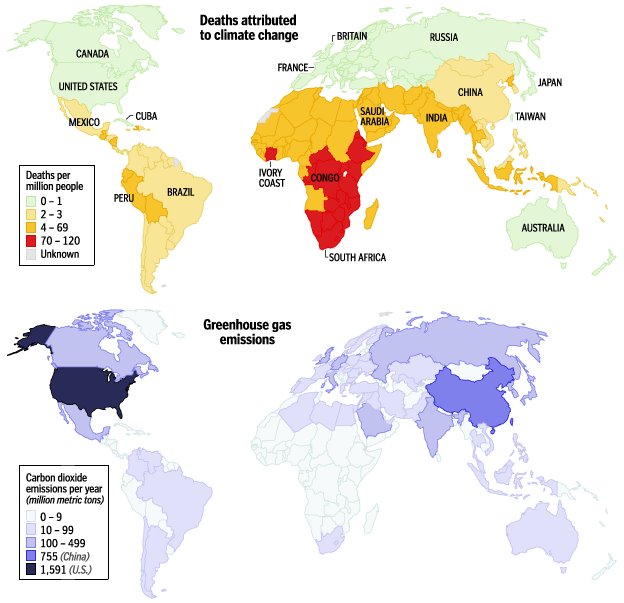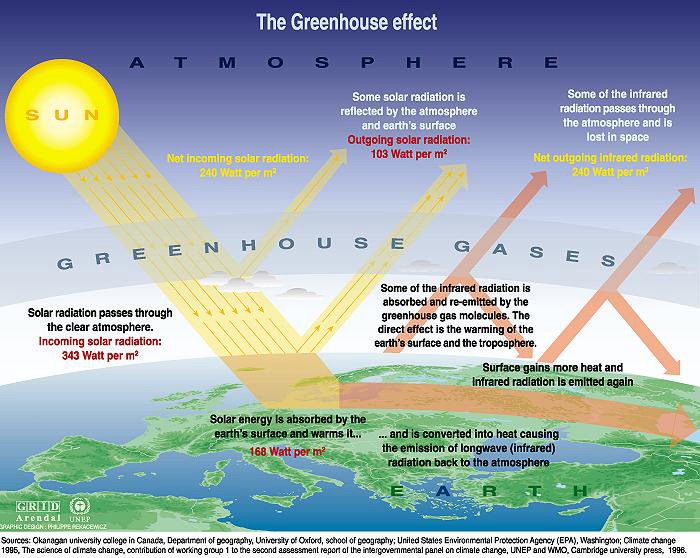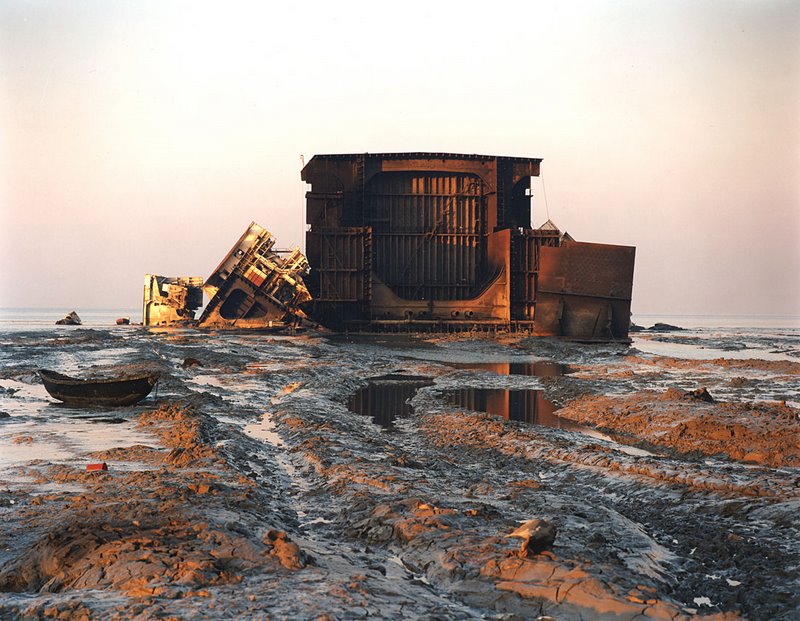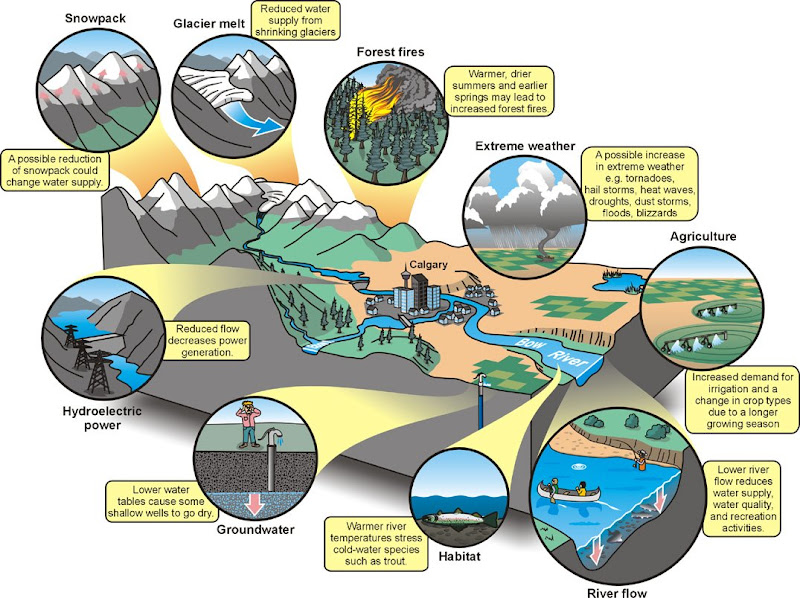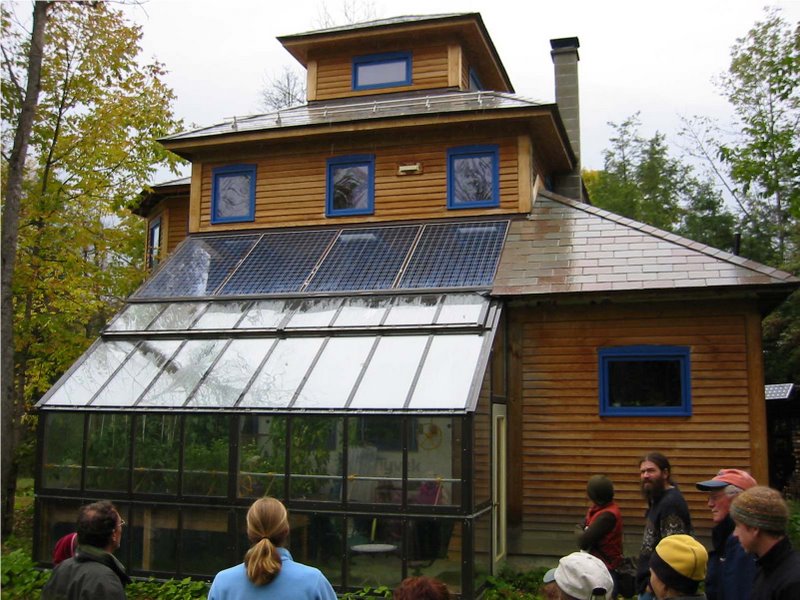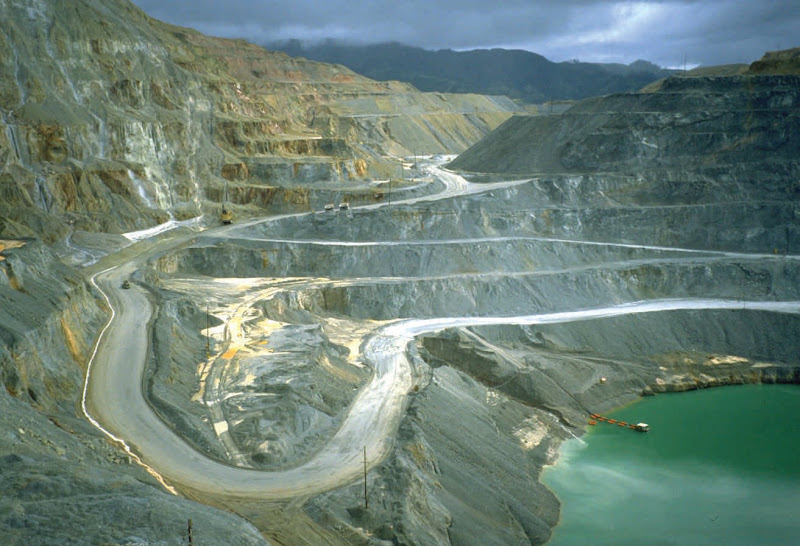Wednesday, June 9, 2010
Bio-char skepticism
There is a strong statement against biochar at this site (below). Many objections are raised in the article. It's the first time I had seen such a statement, so I'm sharing it. Biochar seems to be a technological solution - a form of geo-engineering - with possible unintended consequences and costs. It has gained in popularity in the
last year and is being widely advanced in climate analyst and scientific circles.
http://climateandcapitalism.com/
The biochar ideas raises the ethical questions associated with other localized technological solutions: nuclear energy, sulphur particles in the atmosphere, iron filings in the seas, carbon sequestration. Not all these technologies are alike in all respects, but they do share some commonalities. Before I launch into my crtitique, I should add that I do not have the final answers. This is a provisional set of statements. I raised these points for discussion only, because it seems important to do so, and I welcome alternative points of view.
Roughly speaking, these localized technological solutions share these problematic characteristics, which need to be considered prior to their implementation:
1) They have social and environmental costs attached to them, which from a deontological ethical perspective, negates their value. From this perspective it is morally wrong to make x pay the cost for the benefit of y, if x and y are equals. All human beings are equals in this view.
In other words, the rights of individuals and minorities must be upheld and solutions to social or environmental problems must take into account those individual or local community rights. Solutions must be "universalizable." From a deontological perspective, war would not be justifiable, and nor would any development project which imposed burdens on local populations for the sake of the economic prosperity of the larger society.
However, from a utilitarian perspective, which allows for minority populations or individuals to suffer for the good of the greater happiness, such technologies - if they worked - would be considered ethically acceptable. It is this ethic which is being used (implicitly, not explicitly) right now.
The utilitarian perspective will seem practically necessary to many, given how widespread human self-interest and faith in technology appears to be, but it is still morally wrong (in my opinion) for the reasons stated above, and given limited time and resources, climate change mitigation requires the choice of one or the other perspective and set of commitments associated with it.
As I hope to demonstrate in these few paragraphs, the deontological perspective can be (roughly) associated with a no-growth economy and investment in renewables and other intermediate technologies, and the utilitarian perspective can be associated with advocacy for high-tech solutions which have localized costs and which are often used in connection with justifying the current model of unlimited economic growth.
2) There are local consequences that no one can anticipate fully, but advocates for these technologies are advancing them nonetheless as mitigation techniques for climate change. Their use in the world is being advanced as an experiment and local populations and ecoystems are part of that experiment, which raises ethical objections.
The regulatory framework and environmental assessments - if they are applied - be described as utiliarian in their bias, using a risk management methodology. The risks are borne by local populations, often without their consent, and also by future generations, who cannot give their consent.
3) Advancing these technological solutions is tantamount to accepting the unsustainable status quo of unlimited economic growth. The "magic buckshot" ethic advanced by many climate policy analysts - which is a mix of existing and experimental technologies - ignores the fact that funds spent on experimental technologies could be better spent on renewables.
The latter (renewables) are associated with energy conservation and widespread behavioral change and are therefore not considered viable of their own, within the context of the economic growth paradigm.
4) There are high financial costs as well attached to them, and in a world of limited funding for climate change mitigation, it is arguable that such funding could be better spent on proven technologies (renewables) where the social and environmental costs are relatively minor. This is especially the case with nuclear energy, but the argument may be applicable to biochar as well, depending on the costs
associated with implementing it on a widespread scale.
From this perspective, it is an either/or scenario, financially: if funds and energies are spent on experimental solutions which potentially would allow the economic growth regime to continue, they take away from relatively low-cost intermediate technology solutions which require greater energy efficiency and behavioral change (a low growth or no growth economy).
The perspective in general use among analysts and polticians right now is that we must try all possible options and see which one works, or which combination of them work, and commit to that. But in the case of nuclear energy and renewables, limited funding spent on one is necessarily not spent on the other. This could also be the case with biochar, depending on how much its implementation on a widespread
scale might cost.
It should also be added that the least expensive option available for mitigating climate change on a large scale is the elimination of factory farms and a severe reduction in meat consumption in industrialized nations which rely on factory farms for food. According to a 2007 U.N. report, 18% of global greenhouse gases from industrial meat production.
last year and is being widely advanced in climate analyst and scientific circles.
http://climateandcapitalism.com/
The biochar ideas raises the ethical questions associated with other localized technological solutions: nuclear energy, sulphur particles in the atmosphere, iron filings in the seas, carbon sequestration. Not all these technologies are alike in all respects, but they do share some commonalities. Before I launch into my crtitique, I should add that I do not have the final answers. This is a provisional set of statements. I raised these points for discussion only, because it seems important to do so, and I welcome alternative points of view.
Roughly speaking, these localized technological solutions share these problematic characteristics, which need to be considered prior to their implementation:
1) They have social and environmental costs attached to them, which from a deontological ethical perspective, negates their value. From this perspective it is morally wrong to make x pay the cost for the benefit of y, if x and y are equals. All human beings are equals in this view.
In other words, the rights of individuals and minorities must be upheld and solutions to social or environmental problems must take into account those individual or local community rights. Solutions must be "universalizable." From a deontological perspective, war would not be justifiable, and nor would any development project which imposed burdens on local populations for the sake of the economic prosperity of the larger society.
However, from a utilitarian perspective, which allows for minority populations or individuals to suffer for the good of the greater happiness, such technologies - if they worked - would be considered ethically acceptable. It is this ethic which is being used (implicitly, not explicitly) right now.
The utilitarian perspective will seem practically necessary to many, given how widespread human self-interest and faith in technology appears to be, but it is still morally wrong (in my opinion) for the reasons stated above, and given limited time and resources, climate change mitigation requires the choice of one or the other perspective and set of commitments associated with it.
As I hope to demonstrate in these few paragraphs, the deontological perspective can be (roughly) associated with a no-growth economy and investment in renewables and other intermediate technologies, and the utilitarian perspective can be associated with advocacy for high-tech solutions which have localized costs and which are often used in connection with justifying the current model of unlimited economic growth.
2) There are local consequences that no one can anticipate fully, but advocates for these technologies are advancing them nonetheless as mitigation techniques for climate change. Their use in the world is being advanced as an experiment and local populations and ecoystems are part of that experiment, which raises ethical objections.
The regulatory framework and environmental assessments - if they are applied - be described as utiliarian in their bias, using a risk management methodology. The risks are borne by local populations, often without their consent, and also by future generations, who cannot give their consent.
3) Advancing these technological solutions is tantamount to accepting the unsustainable status quo of unlimited economic growth. The "magic buckshot" ethic advanced by many climate policy analysts - which is a mix of existing and experimental technologies - ignores the fact that funds spent on experimental technologies could be better spent on renewables.
The latter (renewables) are associated with energy conservation and widespread behavioral change and are therefore not considered viable of their own, within the context of the economic growth paradigm.
4) There are high financial costs as well attached to them, and in a world of limited funding for climate change mitigation, it is arguable that such funding could be better spent on proven technologies (renewables) where the social and environmental costs are relatively minor. This is especially the case with nuclear energy, but the argument may be applicable to biochar as well, depending on the costs
associated with implementing it on a widespread scale.
From this perspective, it is an either/or scenario, financially: if funds and energies are spent on experimental solutions which potentially would allow the economic growth regime to continue, they take away from relatively low-cost intermediate technology solutions which require greater energy efficiency and behavioral change (a low growth or no growth economy).
The perspective in general use among analysts and polticians right now is that we must try all possible options and see which one works, or which combination of them work, and commit to that. But in the case of nuclear energy and renewables, limited funding spent on one is necessarily not spent on the other. This could also be the case with biochar, depending on how much its implementation on a widespread
scale might cost.
It should also be added that the least expensive option available for mitigating climate change on a large scale is the elimination of factory farms and a severe reduction in meat consumption in industrialized nations which rely on factory farms for food. According to a 2007 U.N. report, 18% of global greenhouse gases from industrial meat production.
Saturday, June 5, 2010
Lecture for G8/G20 teach-in on environmental justice
Lecture for the G8/G20 teach-in on environmental justice
___________
Reflections on local community struggles for climate justice in the face of hazardous hi-tech technology
My contribution to this discussion is inspired in part by my experiences working with activists who came here from other countries - Mexico, Papua New Guinea, Chile, and Australia - to oppose gold mining on their lands, and in part by the experience of the residents of the San Joaquin Valley, one of the poorer areas of California, and where a lot of industrial projects, oil extraction and industrial waste is located, and where residents have organized to oppose these things.
I will begin by providing a simple but important thought: "A healthy environment is a human right." This idea was ratified in a precedent-setting court case in Colombia in 1991, (Fundepúblico v. Mayor of Bugalagrande). The plaintiffs sought to prevent actual and imminent damage as a result of an asphalt plant's operations in their town. The Constitutional Court sided with them saying: "Everyone has the right to enjoy and live in a healthy environment. This should be regarded as a fundamental human right, which is a prerequisite and basis for the exercise of other human, economic and political rights. It should be recognized that a healthy environment is a sine qua non condition for life itself and that no right could be exercised in a deeply altered environment."
As we have heard from Simia and Judy, climate change is connected to many different struggles for justice around the globe. Our presentations are intended to convey the idea that concern for climate change should not be thought of abstractly as something that could happen in some other time and place, but is happening as we speak, and it is not the "Earth" or "the planet" that should concern us so much as people who are already suffering from environmental damage caused by unsustainable industrial development.
As Oren Lyons of the turtle clan of the Seneca Nation of the Iroquois Confederacy has said, "The Earth has all the time in the world; we don't. "Part of this G8 protest will be an expression of solidarity with rural and indigenous peoples already fighting climate injustice, in relation to the tar sands, Guatemala, and other regions of the world. Many of the communities already live (and have lived for aeons) in a truly sustainable way, growing their food and living within the means provided by the local environment. They should serve as an example to us of how to live, but instead our civilization is destroying their livlihood, in countless examples, largely through extraction industries. An example that comes to mind is oil spills in Nigeria, which have been as horrible as the recent BP spill, but have not received the same degree of media attention because they occurred far from the media's scope of concern.
Most of you have heard Martin Luther King Jr's words, "Injustice anywhere is a threat to justice everywhere." Another way of saying this is that the injustice suffered by an individual or isolated community should matter to us as much as injustices which affect great numbers or which have a higher profile. I will give you one example: in Papua New Guinea, the wealthy gold mining company Barrick Gold is dumping toxic mine tailings into the local river, poisoning their water supply, while Barrick guards murder local citizens and burn down their houses. That fact that they are on the other side of the world should not prevent us from acting in solidarity with them, especially since Canada allows companies like Barrick Gold to operate with impunity.
The damage caused by extraction industries is a clear case of environmental injustice, but what about a situation where there is said to be some environmental benefit that requires putting local populations at risk? As the climate crisis worsens we will hear more and more about cases where local populations protest the implementation of a supposedly beneficial technology. I am not talking about middle-class people in Canada protesting wind turbines because it obstructs their view, but rather cases such as the Western Shoshone in Nevada or the Diagatas in Chile opposing uranium mining on their lands, or the displacement of local peoples and destruction of biodiverse ecosystems to produce biofuels or eucalyptus plantations, listed as carbon sinks in carbon-trading schemes.
Throughout history we always find that terrible things are done in the name of some greater good. The history of religion provides many of instances of this, and in the same way capitalism has been described as a kind of religion which sacrifices millions of people, and billions of animals for its particular vision of a higher good. Its high priests, the economists and policy analysts, are now endorsing a "magic buckshot" solution to climate change, which preserves the existing unsustainable system and sacrifices local populations to it. The problem with the magic buckshot idea is that it assumes unlimited funding. But as opponents to nuclear energy point out, the public funds used to finance it could better be used to pay for renewables and energy conservation projects. In practice, hi-tech solutions are being given precedence, in industrialized nations, in order to prop up the existing deeply flawed system.
Countries around the globe are spending billions of their citizen’s money to carbon sequestration, while ignoring critical knowledge gaps and their potential implications. Emily Rochon of Greenpeace notes that “The future of the planet is being gambled on a technological solution that could turn out to be an end of the pipe dream. Governments need to invest in proven solutions like wind, solar and the smarter use of power.” Scientific research says that if we want to avoid catastrophic climate change, global greenhouse gas emissions must peak by 2015 and fall dramatically thereafter. That leaves about six years to shift energy systems to a low emissions pathway.
The centralized technologies that many of the G8 leaders endorse as solutions for climate change will take longer that six years to fully implement. They include nuclear energy requiring uranium mining, which pollutes surface air and water with radioactive mine waste, sometimes mined near aboriginal communities, causing health problems for them (at the end of the uranium life cycle a favourite dumping ground for the waste is First Nations lands); carbon geologic sequestration, a relatively new technology, places local populations and ecosystems at risk of poisoning from sequestered carbon gas leaking to the surface and into ground water; and geo-engineering schemes - one of which is to cool the atmosphere by injecting sulphur particles into it, which risks burning away part of the ozone layer - are being promoted without full consideration of all their consequences. Employing a utilitarian ethic, they are suggesting that the risks are acceptable. This is usually because those at most risk are abstract numbers to them, not living breathing individuals, whose lives matter.
According to David Orr in his book Ecological Literacy, “advocates of technological sustainability tend to believe that every problem has either a technological answer or a market solution ... [resting on] the belief that humans should be rich and in control of the forces of nature … [this belief maintains that] humans as economic maximizers are incapable of the discipline implied by limits even though they are somehow capable of the wisdom and good judgment necessary to manage all the of the earth’s resources in perpetuity. This deeply pessimistic view of human potentials assumes that we cannot control our appetites, act for the common good, or wisely direct our collective energies … [they also believe that] economic growth is essential … but growth implies an eventual impossibility in a finite system … If sustainability is a top-down process [controlled by economists, scientists and policy experts] then an active, ecologically competent citizenry is irrelevant … ecological politics is reduced to “managerial strategies.” In contrast to technological sustainability is more decentralized ecological sustainability, restoring civic involvement, borrowing from traditional knowledge, and viewing natures as a model for human designers to emulate.
A basic principle being expressed in this presentation is that everyone counts, no matter how far away, however marginalized economically, racially, culturally or otherwise, and an injustice to one is an injustice to all. And it is not only human beings who are victims of capitalism, but also animals - by the billions - and their fate is intimately tied to our own, on many levels, including the danger posed to all land-based life forms by the acidification of the oceans, and the greenhouse gases caused by factory farming. An analysis of environmental injustice affecting humanity has to include other consideration of other species, because what happens to them affects us. One way of expressing this is Aldo Leopold's "land ethic" which changes the role of Homo sapiens from conqueror of the land-community to plain member and citizen of it. It implies respect for his (or her) fellow-members, and also respect for the community as such." This is something we can learn from the self-sufficient rural communities who bear the brunt of the extraction industries.
With hi-tech solutions, the short term benefit is used to justify the risk to the local population. But if we follow the principle to "always treat others as an end in themselves, not as a means to an end," such technologies cannot be morally justified, because we are recognizing the importance of these affected communities.
This is a basic idea: no one should be forgotten or sacrificed for some supposedly higher cause, however noble it seems at the time - even the noble end of climate change mitigation. If populations are sacrificed or put at risk, this is not morally consistent with the initial concern, why we think climate change needs to be addressed.
Solutions to the climate crisis need to be made which take into account the well-being of everyone, and this requires a much more democratic system than now exists. The United Nations is being used a vehicle for the voices of the many, but civil protest and forums like this one are more local methods for expressing solidarity and concern. The billion dollars spend on suppressing dissent should be been spent on renewable energy and creating green jobs.
This century will be one of unprecedented change and violence and many corporations, politicians and other guardians of power will want to implement supposed solutions, usually for the benefit of their particular constituency. They will use the existing and impending disasters to justify curtailment of civil rights - eventually leading to totalitarianism here - and as part of that they will justify the use of unproven technologies without the free and informed consent of local populations or adequate environment assessments. In fact this is already happening in more cases than any of us are aware. These essentially unproven technologies are being advanced for one reason: to allow business-as-usual to continue unimpeded, rather than go in the direction of a more democratic, just and sustainable low-growth or no-growth economy.
According to Tim Jackson in Prosperity Without Growth, “The narrow pursuit of growth represents a horrible distortion of the common good and of underlying human values. It also undermines the legitimate role of government itself. At the end of the day, the state is society’s commitment device, par excellence, and the principal agent in protecting our shared prosperity. A new vision of governance that embraces this role is urgently needed.”
The same philosopher who said "always treat others as an end in themselves, not as a means to an end" (Kant) also said "act as if the whole world depended on your actions." Protesting is doing just that. And in a way it is true: these protests are ultimately important because we are living in an unprecedented historical period of a few years, when the actions of a few conscientious individuals and groups can make all the difference for billions of people and every living thing on the planet. Meaning that we have only a short time to bring about necessary changes, and in industrialized nations, which are most responsible for the crisis, we have the greatest responsibility for mitigation effort. The temptation is to use unproven technologies, rather than change society from the bottom up. But mitigation technologies which harm local populations do not meet the test of justice, and for this reason they will not solve the fundamental problems. Environmental concern and social justice are inseparable.
A good phrase to describe the thinking behind the implementation of false solutions is "technological elitism" and even "environmental fascism" - the idea that individuals or small groups need not be consulted, and are essentially expendable for the sake of what some environmental good. But in every case we find that the local environment and thus the local population that inhabits it is put at grave risk from environmental pollutions. Environmental integrity and the preservation of human rights are complimentary through local food production, but in many of the cases of development versus the community, local food production is endangered when water is used up and contaminated.
Those who promote hi-tech solutions have created of a regulatory framework for environmental assessments, using the language or risk assessment and cost-benefit analysis, which in most cases is used to justify the local risks, rather than prevent them. A utilitarian thinking is adopted, which typically fails to take into account the well-being of the local population or that of future generations inhabiting the same land or using the contaminated water. They are considered expendable, or not even taken into account. "We have without any public debate accepted all of the implications of what Ulrich Beck has called the "risk society." The risk society makes the globe the laboratory for its experiments. As we have seen, theories of nuclear reactor safety are testable only after they are built, not beforehand. – (Lawrence Schmidt)
Zygmunt Bauman points out that the language of risk is associated with gambling rather than ethics. The gambler enjoys the play even if he loses his bet. What is at stake in a risk society, however, is not merely the loss of a wager but the loss of the planet as a human habitat.
Instead of a "risk management" language governments and policy advisors would do well to heed the works of Ursula Franklin, who said that "Many technological systems are basically anti-people. People are seen as the sources of problems while technology is seen as the source of solutions." In the assessments for mitigation technologies, such as carbon sequestration, the public acceptance and the consent of local populations are seen as a barrier to the implementation of the technologies.
Another critic of nuclear technology, Fred Knellman said that "No matter how small the probability of an accident, the risk is still too large to be acceptable to present or future generations ... Only zero risk would be socially acceptable, given the fact that there are alternative options for securing society's genuine energy requirements.“
Ursula Franklin says that before a technology is implemented we should be sure it promotes justice, that if favours people over machines, that it favours conservation over waste, and that its effects should be reversible. Marginal populations should be consulted. Currently there is either a disingenuous consultation process, when it comes to these technologies - where those most affected are not notified or their concerns dismissed.
We can also understand these centralized technological solutions as insubstantial reforms, an effort to appease the public, examples of "greenwash." Imperial Oil and Barrick Gold now claim to be "sustainable" and "good corporate citizens." But mere reforms, even if they are genuinely motivated, are inadequate because these leaders subscribe to an inherently unjust and unsustainable ideological framework, capitalism, which cannot be reformed on the scale that's needed to avert global catastrophe. We could say that their blind faith in technological solutions to the climate crisis are really ways of avoiding the more substantial structural changes needed, changes that would put them out of business because their business are inherently unjust and unsustainable.
One way of expressing the needed change, is that we must go from a system dedicated to unlimited economic growth for on a planet of finite resources, created for the benefit of a few, to a truly democratic no-growth economy which takes into account finite resources, and is used wisely for the benefit of all. The no-growth economy is an idea gaining currency. The traditional economic infatuation with rising GDP is no longer rationally defensible in a world of finite resources. Instead of centralized hi-tech solutions we need more decentralized intermediate technologies, such as renewable energy.
According to Tim Jackson, "a less materialistic society will enhance life satisfaction. A more equal society will lower the importance of status goods. A less growth-driven economy will improve people’s work-life balance. Enhanced investment in public goods will provide lasting returns to the nation’s prosperity .”
The basic principle here is that the integrity and self-sufficiency of local rural populations - who are already growing their own food and living sustainably, who represent the direction humanity needs to go in - should not be compromised by these top-down false solutions.
It is up to us to use our abilities and privileges in this society to work in solidaridity with affected communities, to oppose unsustainable development. The fight against climate change will be won through grassroots activism and people's movements, not through solutions imposed through the same sort of overreliance on technology that led to this crisis. This is something the G8 leaders need to understand and take to heart. Your protest is important for reminding them and the public that solutions to our common problems must be founded on principles of justice, which take into account all people everywhere, and are not merely for the benefit of a privileged elite.
___________
Reflections on local community struggles for climate justice in the face of hazardous hi-tech technology
My contribution to this discussion is inspired in part by my experiences working with activists who came here from other countries - Mexico, Papua New Guinea, Chile, and Australia - to oppose gold mining on their lands, and in part by the experience of the residents of the San Joaquin Valley, one of the poorer areas of California, and where a lot of industrial projects, oil extraction and industrial waste is located, and where residents have organized to oppose these things.
I will begin by providing a simple but important thought: "A healthy environment is a human right." This idea was ratified in a precedent-setting court case in Colombia in 1991, (Fundepúblico v. Mayor of Bugalagrande). The plaintiffs sought to prevent actual and imminent damage as a result of an asphalt plant's operations in their town. The Constitutional Court sided with them saying: "Everyone has the right to enjoy and live in a healthy environment. This should be regarded as a fundamental human right, which is a prerequisite and basis for the exercise of other human, economic and political rights. It should be recognized that a healthy environment is a sine qua non condition for life itself and that no right could be exercised in a deeply altered environment."
As we have heard from Simia and Judy, climate change is connected to many different struggles for justice around the globe. Our presentations are intended to convey the idea that concern for climate change should not be thought of abstractly as something that could happen in some other time and place, but is happening as we speak, and it is not the "Earth" or "the planet" that should concern us so much as people who are already suffering from environmental damage caused by unsustainable industrial development.
As Oren Lyons of the turtle clan of the Seneca Nation of the Iroquois Confederacy has said, "The Earth has all the time in the world; we don't. "Part of this G8 protest will be an expression of solidarity with rural and indigenous peoples already fighting climate injustice, in relation to the tar sands, Guatemala, and other regions of the world. Many of the communities already live (and have lived for aeons) in a truly sustainable way, growing their food and living within the means provided by the local environment. They should serve as an example to us of how to live, but instead our civilization is destroying their livlihood, in countless examples, largely through extraction industries. An example that comes to mind is oil spills in Nigeria, which have been as horrible as the recent BP spill, but have not received the same degree of media attention because they occurred far from the media's scope of concern.
Most of you have heard Martin Luther King Jr's words, "Injustice anywhere is a threat to justice everywhere." Another way of saying this is that the injustice suffered by an individual or isolated community should matter to us as much as injustices which affect great numbers or which have a higher profile. I will give you one example: in Papua New Guinea, the wealthy gold mining company Barrick Gold is dumping toxic mine tailings into the local river, poisoning their water supply, while Barrick guards murder local citizens and burn down their houses. That fact that they are on the other side of the world should not prevent us from acting in solidarity with them, especially since Canada allows companies like Barrick Gold to operate with impunity.
The damage caused by extraction industries is a clear case of environmental injustice, but what about a situation where there is said to be some environmental benefit that requires putting local populations at risk? As the climate crisis worsens we will hear more and more about cases where local populations protest the implementation of a supposedly beneficial technology. I am not talking about middle-class people in Canada protesting wind turbines because it obstructs their view, but rather cases such as the Western Shoshone in Nevada or the Diagatas in Chile opposing uranium mining on their lands, or the displacement of local peoples and destruction of biodiverse ecosystems to produce biofuels or eucalyptus plantations, listed as carbon sinks in carbon-trading schemes.
Throughout history we always find that terrible things are done in the name of some greater good. The history of religion provides many of instances of this, and in the same way capitalism has been described as a kind of religion which sacrifices millions of people, and billions of animals for its particular vision of a higher good. Its high priests, the economists and policy analysts, are now endorsing a "magic buckshot" solution to climate change, which preserves the existing unsustainable system and sacrifices local populations to it. The problem with the magic buckshot idea is that it assumes unlimited funding. But as opponents to nuclear energy point out, the public funds used to finance it could better be used to pay for renewables and energy conservation projects. In practice, hi-tech solutions are being given precedence, in industrialized nations, in order to prop up the existing deeply flawed system.
Countries around the globe are spending billions of their citizen’s money to carbon sequestration, while ignoring critical knowledge gaps and their potential implications. Emily Rochon of Greenpeace notes that “The future of the planet is being gambled on a technological solution that could turn out to be an end of the pipe dream. Governments need to invest in proven solutions like wind, solar and the smarter use of power.” Scientific research says that if we want to avoid catastrophic climate change, global greenhouse gas emissions must peak by 2015 and fall dramatically thereafter. That leaves about six years to shift energy systems to a low emissions pathway.
The centralized technologies that many of the G8 leaders endorse as solutions for climate change will take longer that six years to fully implement. They include nuclear energy requiring uranium mining, which pollutes surface air and water with radioactive mine waste, sometimes mined near aboriginal communities, causing health problems for them (at the end of the uranium life cycle a favourite dumping ground for the waste is First Nations lands); carbon geologic sequestration, a relatively new technology, places local populations and ecosystems at risk of poisoning from sequestered carbon gas leaking to the surface and into ground water; and geo-engineering schemes - one of which is to cool the atmosphere by injecting sulphur particles into it, which risks burning away part of the ozone layer - are being promoted without full consideration of all their consequences. Employing a utilitarian ethic, they are suggesting that the risks are acceptable. This is usually because those at most risk are abstract numbers to them, not living breathing individuals, whose lives matter.
According to David Orr in his book Ecological Literacy, “advocates of technological sustainability tend to believe that every problem has either a technological answer or a market solution ... [resting on] the belief that humans should be rich and in control of the forces of nature … [this belief maintains that] humans as economic maximizers are incapable of the discipline implied by limits even though they are somehow capable of the wisdom and good judgment necessary to manage all the of the earth’s resources in perpetuity. This deeply pessimistic view of human potentials assumes that we cannot control our appetites, act for the common good, or wisely direct our collective energies … [they also believe that] economic growth is essential … but growth implies an eventual impossibility in a finite system … If sustainability is a top-down process [controlled by economists, scientists and policy experts] then an active, ecologically competent citizenry is irrelevant … ecological politics is reduced to “managerial strategies.” In contrast to technological sustainability is more decentralized ecological sustainability, restoring civic involvement, borrowing from traditional knowledge, and viewing natures as a model for human designers to emulate.
A basic principle being expressed in this presentation is that everyone counts, no matter how far away, however marginalized economically, racially, culturally or otherwise, and an injustice to one is an injustice to all. And it is not only human beings who are victims of capitalism, but also animals - by the billions - and their fate is intimately tied to our own, on many levels, including the danger posed to all land-based life forms by the acidification of the oceans, and the greenhouse gases caused by factory farming. An analysis of environmental injustice affecting humanity has to include other consideration of other species, because what happens to them affects us. One way of expressing this is Aldo Leopold's "land ethic" which changes the role of Homo sapiens from conqueror of the land-community to plain member and citizen of it. It implies respect for his (or her) fellow-members, and also respect for the community as such." This is something we can learn from the self-sufficient rural communities who bear the brunt of the extraction industries.
With hi-tech solutions, the short term benefit is used to justify the risk to the local population. But if we follow the principle to "always treat others as an end in themselves, not as a means to an end," such technologies cannot be morally justified, because we are recognizing the importance of these affected communities.
This is a basic idea: no one should be forgotten or sacrificed for some supposedly higher cause, however noble it seems at the time - even the noble end of climate change mitigation. If populations are sacrificed or put at risk, this is not morally consistent with the initial concern, why we think climate change needs to be addressed.
Solutions to the climate crisis need to be made which take into account the well-being of everyone, and this requires a much more democratic system than now exists. The United Nations is being used a vehicle for the voices of the many, but civil protest and forums like this one are more local methods for expressing solidarity and concern. The billion dollars spend on suppressing dissent should be been spent on renewable energy and creating green jobs.
This century will be one of unprecedented change and violence and many corporations, politicians and other guardians of power will want to implement supposed solutions, usually for the benefit of their particular constituency. They will use the existing and impending disasters to justify curtailment of civil rights - eventually leading to totalitarianism here - and as part of that they will justify the use of unproven technologies without the free and informed consent of local populations or adequate environment assessments. In fact this is already happening in more cases than any of us are aware. These essentially unproven technologies are being advanced for one reason: to allow business-as-usual to continue unimpeded, rather than go in the direction of a more democratic, just and sustainable low-growth or no-growth economy.
According to Tim Jackson in Prosperity Without Growth, “The narrow pursuit of growth represents a horrible distortion of the common good and of underlying human values. It also undermines the legitimate role of government itself. At the end of the day, the state is society’s commitment device, par excellence, and the principal agent in protecting our shared prosperity. A new vision of governance that embraces this role is urgently needed.”
The same philosopher who said "always treat others as an end in themselves, not as a means to an end" (Kant) also said "act as if the whole world depended on your actions." Protesting is doing just that. And in a way it is true: these protests are ultimately important because we are living in an unprecedented historical period of a few years, when the actions of a few conscientious individuals and groups can make all the difference for billions of people and every living thing on the planet. Meaning that we have only a short time to bring about necessary changes, and in industrialized nations, which are most responsible for the crisis, we have the greatest responsibility for mitigation effort. The temptation is to use unproven technologies, rather than change society from the bottom up. But mitigation technologies which harm local populations do not meet the test of justice, and for this reason they will not solve the fundamental problems. Environmental concern and social justice are inseparable.
A good phrase to describe the thinking behind the implementation of false solutions is "technological elitism" and even "environmental fascism" - the idea that individuals or small groups need not be consulted, and are essentially expendable for the sake of what some environmental good. But in every case we find that the local environment and thus the local population that inhabits it is put at grave risk from environmental pollutions. Environmental integrity and the preservation of human rights are complimentary through local food production, but in many of the cases of development versus the community, local food production is endangered when water is used up and contaminated.
Those who promote hi-tech solutions have created of a regulatory framework for environmental assessments, using the language or risk assessment and cost-benefit analysis, which in most cases is used to justify the local risks, rather than prevent them. A utilitarian thinking is adopted, which typically fails to take into account the well-being of the local population or that of future generations inhabiting the same land or using the contaminated water. They are considered expendable, or not even taken into account. "We have without any public debate accepted all of the implications of what Ulrich Beck has called the "risk society." The risk society makes the globe the laboratory for its experiments. As we have seen, theories of nuclear reactor safety are testable only after they are built, not beforehand. – (Lawrence Schmidt)
Zygmunt Bauman points out that the language of risk is associated with gambling rather than ethics. The gambler enjoys the play even if he loses his bet. What is at stake in a risk society, however, is not merely the loss of a wager but the loss of the planet as a human habitat.
Instead of a "risk management" language governments and policy advisors would do well to heed the works of Ursula Franklin, who said that "Many technological systems are basically anti-people. People are seen as the sources of problems while technology is seen as the source of solutions." In the assessments for mitigation technologies, such as carbon sequestration, the public acceptance and the consent of local populations are seen as a barrier to the implementation of the technologies.
Another critic of nuclear technology, Fred Knellman said that "No matter how small the probability of an accident, the risk is still too large to be acceptable to present or future generations ... Only zero risk would be socially acceptable, given the fact that there are alternative options for securing society's genuine energy requirements.“
Ursula Franklin says that before a technology is implemented we should be sure it promotes justice, that if favours people over machines, that it favours conservation over waste, and that its effects should be reversible. Marginal populations should be consulted. Currently there is either a disingenuous consultation process, when it comes to these technologies - where those most affected are not notified or their concerns dismissed.
We can also understand these centralized technological solutions as insubstantial reforms, an effort to appease the public, examples of "greenwash." Imperial Oil and Barrick Gold now claim to be "sustainable" and "good corporate citizens." But mere reforms, even if they are genuinely motivated, are inadequate because these leaders subscribe to an inherently unjust and unsustainable ideological framework, capitalism, which cannot be reformed on the scale that's needed to avert global catastrophe. We could say that their blind faith in technological solutions to the climate crisis are really ways of avoiding the more substantial structural changes needed, changes that would put them out of business because their business are inherently unjust and unsustainable.
One way of expressing the needed change, is that we must go from a system dedicated to unlimited economic growth for on a planet of finite resources, created for the benefit of a few, to a truly democratic no-growth economy which takes into account finite resources, and is used wisely for the benefit of all. The no-growth economy is an idea gaining currency. The traditional economic infatuation with rising GDP is no longer rationally defensible in a world of finite resources. Instead of centralized hi-tech solutions we need more decentralized intermediate technologies, such as renewable energy.
According to Tim Jackson, "a less materialistic society will enhance life satisfaction. A more equal society will lower the importance of status goods. A less growth-driven economy will improve people’s work-life balance. Enhanced investment in public goods will provide lasting returns to the nation’s prosperity .”
The basic principle here is that the integrity and self-sufficiency of local rural populations - who are already growing their own food and living sustainably, who represent the direction humanity needs to go in - should not be compromised by these top-down false solutions.
It is up to us to use our abilities and privileges in this society to work in solidaridity with affected communities, to oppose unsustainable development. The fight against climate change will be won through grassroots activism and people's movements, not through solutions imposed through the same sort of overreliance on technology that led to this crisis. This is something the G8 leaders need to understand and take to heart. Your protest is important for reminding them and the public that solutions to our common problems must be founded on principles of justice, which take into account all people everywhere, and are not merely for the benefit of a privileged elite.
Tuesday, May 4, 2010
Strong critique of UTERN
There is something called UTERN - or University of Toronto Environmental Network - a collection of students who get to dispense a $30,000 student levy to other students to facilitate environmental projects or events. Is this a good or bad thing for student environmentalism? I will argue here that UTERN's existence is detrimental to student environmentalism because it de-politicizes it and creates an atmosphere in which student environmentalism is identified with a kind of apolitical non-controversial acceptance of the status quo.
UTERN refuses to take a stand against the tar sands, the central symbol of environmental destruction in Canada. Collectively UTERN will not condemn the tar sands - which became evident to me a couple of years ago at a showing of a film on the tar sands which many UTERN members attended. Not one of their number spoke up against it.
The status quo is entirely unacceptable however: we are in the midst of a climate crisis and students need to be more vigilent against it and the forces responsible for it - including the very corporations that run this university. The corporatization of U of T is a fundamental part of this story. Large multinational corporations such as Exxon Mobil and Barrick Gold can be view as neutral vehicles that can be steered in many directions - thus the concept of corporate social responsibility and "green capitalism" - or we can recognize that some industries are inherently unsustainable and cannot be reformed.
Extraction industries (oil, mining, etc) cannot be reformed because what they do will always damage the environment to a degree that is unacceptable. There is no such thing as "sustainable mining." But apolitical student environmentalism says neither yay nor nay on this question - it is not spoken of at all - with the result that the status quo - unsustainable mining - continues unabated and U of T is the training ground for it.
Students Against Climate Change was founded three years ago, at University of Toronto, in response to the climate crisis. Our hope was to encourage the kind of response that students in other countries have shown. Even in the United States students have demonstrated a stronger response to the environmental crisis than in Canada. Thousands of students rally for needed change in every other country than Canada. Here such movements barely exist and after three years it is obvious why: it has been killed by apolitical student environmentalism which shies away from controversey or taking a stand on anything.
SACC put on hundreds of events on climate change and related issues: films, lectures, conferences, etc. SACC did more of these events than any other group at U of T, before or sincce. The vast majority of those who attended were not students, however. They were over age 30 and from outside the university - mostly concerned citizens, activists, some university staff and faculty. The students were conspicuously absent from all those events - especially the students in UTERN. We collected the emails of about 4,500 people at these events over three years and perhaps less than 5% were students.
Some UTERN members have said that they reject street activism as ineffective. But without it those that are female among them would not be attending university or have the vote. Street activism has always been the vanguard of social and political change, as the womens' rights movement and civil rights movements demonstrate. This is apparently unknown to them or unappreciated by them. So is the fact that street activism is done as much to bring together communities as to effect social change politically.
So what do they do instead? Do they attend and organize educational events instead - conference, lectures, etc - on the subject of climate change? A small handful have done a few things like this, but not to any great degree. There is a growing climate change movement in Toronto, but they are conspicuously absent from this movement as well, according to the more serious activists. So what does UTERN do? Of what does their so-called "activism" consist? Merely attending classes and meetings and fun social events? In what way does that constitute activism?
Perhaps UTERN is merely a stepping stone for those seeking careers in the growing environmental - a field increasingly apolitical and devoid of spirit, absorbed into the corporate worldview that is most responsible for the environmental crisis. Or perhaps it is an elite social club, funded through a student levy which pays for its social events (food, transporation for outings, plan trips to conferences overseas, etc). Why go to a climate change conference in Europe when you don't attend them here and when such trips exacerbate climate change through emissions? What does this mean for the student environmental movement at Univesity of Toronto? It means that it does not exist, or more precisely it exists in small pockets that are fragmented and ineffective.
The University of Toronto has been taken over by the very corporations most responsible for environmental damage, but instead of challenging that, most of the students have chosen to turn a blind eye to it, and to allow themselves to be absorbed into a kind of unconscious "group think" that allows for the unsustainable status quo to continue unchallenged - and they have done this without even being aware of it.
They perhaps imagine that they will be hired by governments or coprorations and change them from the inside; but they will be changed by them. They already have been, it seems. Environmentalism has been co-opted and reduced to platitudes and feel good slogans with the words "green" and "sustainable" in them. The spirit and life has been taken out of it, resulting in greenwash of corporations. There is no response to factory farming or oil spills or the dumping of mine waste in rivers or climate injustice by UTERN. They seem to avoid so-called "politics", even though environmentalism is inherently political and to act apolitically is itself a political act, in cooperation with prevailing powers, in favour of the status quo. Not everyone on UTERN is of this mind, but most are. One wonders what they really hope to acheive.
UTERN reps have said they don't represent the student envionmental movement - they just fund it - but the direction they've taken is decidely against certain tactics and views and in favour of others. They have decided to cooperate with the Administration and the corporations that run them, and make student environmentalism into a vehicle for funding for themselves (UTERN members are paid or receive work-study grants) and careerism (resume-padding).
UTERN represents the death of real student environmentalism at University of Toronto. And this at the time when the climat crisis was never worse. We see now why it is so bad, and why it gets worse every year: UTERN is a microcosmic reflection of the indifference of the larger society which produced it - a society of in which the tars sand continues to expand.
UTERN refuses to take a stand against the tar sands, the central symbol of environmental destruction in Canada. Collectively UTERN will not condemn the tar sands - which became evident to me a couple of years ago at a showing of a film on the tar sands which many UTERN members attended. Not one of their number spoke up against it.
The status quo is entirely unacceptable however: we are in the midst of a climate crisis and students need to be more vigilent against it and the forces responsible for it - including the very corporations that run this university. The corporatization of U of T is a fundamental part of this story. Large multinational corporations such as Exxon Mobil and Barrick Gold can be view as neutral vehicles that can be steered in many directions - thus the concept of corporate social responsibility and "green capitalism" - or we can recognize that some industries are inherently unsustainable and cannot be reformed.
Extraction industries (oil, mining, etc) cannot be reformed because what they do will always damage the environment to a degree that is unacceptable. There is no such thing as "sustainable mining." But apolitical student environmentalism says neither yay nor nay on this question - it is not spoken of at all - with the result that the status quo - unsustainable mining - continues unabated and U of T is the training ground for it.
Students Against Climate Change was founded three years ago, at University of Toronto, in response to the climate crisis. Our hope was to encourage the kind of response that students in other countries have shown. Even in the United States students have demonstrated a stronger response to the environmental crisis than in Canada. Thousands of students rally for needed change in every other country than Canada. Here such movements barely exist and after three years it is obvious why: it has been killed by apolitical student environmentalism which shies away from controversey or taking a stand on anything.
SACC put on hundreds of events on climate change and related issues: films, lectures, conferences, etc. SACC did more of these events than any other group at U of T, before or sincce. The vast majority of those who attended were not students, however. They were over age 30 and from outside the university - mostly concerned citizens, activists, some university staff and faculty. The students were conspicuously absent from all those events - especially the students in UTERN. We collected the emails of about 4,500 people at these events over three years and perhaps less than 5% were students.
Some UTERN members have said that they reject street activism as ineffective. But without it those that are female among them would not be attending university or have the vote. Street activism has always been the vanguard of social and political change, as the womens' rights movement and civil rights movements demonstrate. This is apparently unknown to them or unappreciated by them. So is the fact that street activism is done as much to bring together communities as to effect social change politically.
So what do they do instead? Do they attend and organize educational events instead - conference, lectures, etc - on the subject of climate change? A small handful have done a few things like this, but not to any great degree. There is a growing climate change movement in Toronto, but they are conspicuously absent from this movement as well, according to the more serious activists. So what does UTERN do? Of what does their so-called "activism" consist? Merely attending classes and meetings and fun social events? In what way does that constitute activism?
Perhaps UTERN is merely a stepping stone for those seeking careers in the growing environmental - a field increasingly apolitical and devoid of spirit, absorbed into the corporate worldview that is most responsible for the environmental crisis. Or perhaps it is an elite social club, funded through a student levy which pays for its social events (food, transporation for outings, plan trips to conferences overseas, etc). Why go to a climate change conference in Europe when you don't attend them here and when such trips exacerbate climate change through emissions? What does this mean for the student environmental movement at Univesity of Toronto? It means that it does not exist, or more precisely it exists in small pockets that are fragmented and ineffective.
The University of Toronto has been taken over by the very corporations most responsible for environmental damage, but instead of challenging that, most of the students have chosen to turn a blind eye to it, and to allow themselves to be absorbed into a kind of unconscious "group think" that allows for the unsustainable status quo to continue unchallenged - and they have done this without even being aware of it.
They perhaps imagine that they will be hired by governments or coprorations and change them from the inside; but they will be changed by them. They already have been, it seems. Environmentalism has been co-opted and reduced to platitudes and feel good slogans with the words "green" and "sustainable" in them. The spirit and life has been taken out of it, resulting in greenwash of corporations. There is no response to factory farming or oil spills or the dumping of mine waste in rivers or climate injustice by UTERN. They seem to avoid so-called "politics", even though environmentalism is inherently political and to act apolitically is itself a political act, in cooperation with prevailing powers, in favour of the status quo. Not everyone on UTERN is of this mind, but most are. One wonders what they really hope to acheive.
UTERN reps have said they don't represent the student envionmental movement - they just fund it - but the direction they've taken is decidely against certain tactics and views and in favour of others. They have decided to cooperate with the Administration and the corporations that run them, and make student environmentalism into a vehicle for funding for themselves (UTERN members are paid or receive work-study grants) and careerism (resume-padding).
UTERN represents the death of real student environmentalism at University of Toronto. And this at the time when the climat crisis was never worse. We see now why it is so bad, and why it gets worse every year: UTERN is a microcosmic reflection of the indifference of the larger society which produced it - a society of in which the tars sand continues to expand.
Saturday, May 1, 2010
Negative corporate influence on student environmental activism
Dear Ms. Song,
My main criticism of your article - which is otherwise well-written - is that you avoid the biggest change on university campuses in the last 30 years: how large corporations have take them over. A number of studies bear this out. It has changed how students react. Where before there might have been a challenge to Exxon Mobil or Barrick Gold on campus, now there is silent complicity.
Many of the younger students you spoke to are not "smarter and savvier" than their predecessors; rather, they are more afraid and less vocal and less willing to directly challenge the sources causes of environmental destruction. They are nice people, as individuals, but as a group there prevails an almost anti-activist position among them, so they can hardly be called "activists" without lessening the meaning of the word. This is generally consistent with the direction of the nation as a whole, towards a pro-tar sands pro-Harper milieau.
Your deliberate omission of the increasing power of large corporations on campuses - and especially U of T where it is more the case than any other campus in Canada and how this has contributed to the sea-change in how students respond to the issue - seems to me to be a glaring omission. You told me in the interview you would not touch the issue of corporations. Why I don't know, but I do hope that you will consider doing another story on this, and this time one that investigates this important (and heretofore) missing part of the story.
I sensed the kind of article it would be, from our interview, and that is why I asked you not to appear in it. There is something terribley wrong when students who profess to be environmentalists will not critisize large corporations that are in large part to blame for the environmental crisis - despite all the evidence that they are (e.g. Exxon Mobil's funding of climate change denial).
The fact that I appeared in the article anyway, despite my request, begs the question of jouralistic ethics. That is why I wrote this (below), to clarify the missing and crucial information, which would give readers insight into why many students choose an apolitical and deliberately non-controversial approach.
Sincerely, Paul York
From: Paul York
Date: Thu, 29 Apr 2010 13:47:44 -0400
Subject: letter to the editor
To: lettertoed@thestar.ca
Letter to the editor, Toronto Star
Missing from Vivian Song's analysis of student environmentalism ("Earth Day celebrates 40 years of education and advocacy" April 22) is the fact that since the 1970s, large corporations have taken over campuses.
This has muted student activism and led to a situation in which negotiating the hallways of power is preferred by many students to protest against environmental destruction.
The danger of this more apolitical conciliatory approach is that students who tell themselves they will change things from the inside, hoping to influence the corporations to go "green", are themselves influenced by those corporations to ignore the enormous damage they cause.
Some industries are simply irredeemable and need to be phased out and green jobs put in their place. But those same industries use students and universities to greenwash themselves, and those who object are marginalized and ridiculed as unreasonable "radicals."
Those who protest do not have a less "savvy" voice (which Ms. Song's article implies); rather, they have a less co-opted more principled voice. They are thus more needed at this historical juncture, when climate change, peak oil and finite resource depletion represent an unprecedented convergence of crises.
Extraction industries do not want students to challenge them; they want them to join their ranks. But the history of successful social activism (women's movement, civil rights, etc) shows us that street activism and taking a strong moral stand is needed to effect social and political change.
Painting the portrait of this more co-opted conciliatory type of "activism" as somehow "more sophisticated and savvier" ignores the danger that its practitioners are merely absorbed into the very structures that are leading to unprecedented environmental destruction.
Sincerely, Paul York
Students Against Climate Change
My main criticism of your article - which is otherwise well-written - is that you avoid the biggest change on university campuses in the last 30 years: how large corporations have take them over. A number of studies bear this out. It has changed how students react. Where before there might have been a challenge to Exxon Mobil or Barrick Gold on campus, now there is silent complicity.
Many of the younger students you spoke to are not "smarter and savvier" than their predecessors; rather, they are more afraid and less vocal and less willing to directly challenge the sources causes of environmental destruction. They are nice people, as individuals, but as a group there prevails an almost anti-activist position among them, so they can hardly be called "activists" without lessening the meaning of the word. This is generally consistent with the direction of the nation as a whole, towards a pro-tar sands pro-Harper milieau.
Your deliberate omission of the increasing power of large corporations on campuses - and especially U of T where it is more the case than any other campus in Canada and how this has contributed to the sea-change in how students respond to the issue - seems to me to be a glaring omission. You told me in the interview you would not touch the issue of corporations. Why I don't know, but I do hope that you will consider doing another story on this, and this time one that investigates this important (and heretofore) missing part of the story.
I sensed the kind of article it would be, from our interview, and that is why I asked you not to appear in it. There is something terribley wrong when students who profess to be environmentalists will not critisize large corporations that are in large part to blame for the environmental crisis - despite all the evidence that they are (e.g. Exxon Mobil's funding of climate change denial).
The fact that I appeared in the article anyway, despite my request, begs the question of jouralistic ethics. That is why I wrote this (below), to clarify the missing and crucial information, which would give readers insight into why many students choose an apolitical and deliberately non-controversial approach.
Sincerely, Paul York
From: Paul York
Date: Thu, 29 Apr 2010 13:47:44 -0400
Subject: letter to the editor
To: lettertoed@thestar.ca
Letter to the editor, Toronto Star
Missing from Vivian Song's analysis of student environmentalism ("Earth Day celebrates 40 years of education and advocacy" April 22) is the fact that since the 1970s, large corporations have taken over campuses.
This has muted student activism and led to a situation in which negotiating the hallways of power is preferred by many students to protest against environmental destruction.
The danger of this more apolitical conciliatory approach is that students who tell themselves they will change things from the inside, hoping to influence the corporations to go "green", are themselves influenced by those corporations to ignore the enormous damage they cause.
Some industries are simply irredeemable and need to be phased out and green jobs put in their place. But those same industries use students and universities to greenwash themselves, and those who object are marginalized and ridiculed as unreasonable "radicals."
Those who protest do not have a less "savvy" voice (which Ms. Song's article implies); rather, they have a less co-opted more principled voice. They are thus more needed at this historical juncture, when climate change, peak oil and finite resource depletion represent an unprecedented convergence of crises.
Extraction industries do not want students to challenge them; they want them to join their ranks. But the history of successful social activism (women's movement, civil rights, etc) shows us that street activism and taking a strong moral stand is needed to effect social and political change.
Painting the portrait of this more co-opted conciliatory type of "activism" as somehow "more sophisticated and savvier" ignores the danger that its practitioners are merely absorbed into the very structures that are leading to unprecedented environmental destruction.
Sincerely, Paul York
Students Against Climate Change
Sunday, April 19, 2009
Taking a break ...
Students Against Climate Change has been going solid for two years, organizing at University of Toronto on issues of social and environmental justice. The climate crisis is not taking a break (it is worse than ever) but we have to take a break or burn out. We will keep you posted. In the meantime, do not lose hope: a green economy is possible if everyone does his or her part to get off the green, buy local food (not meat), drive and fly less and continue to advocate for needed changes such as more renewable energy, less nuclear and fewer cars, and more public transportation and more energy conservation. We also need to end the extraction industries and recylce woods, metals, plastics and other resource based products. And continue to stand up for animal rights and biodiversity. We lose 200 species a day and not even one is acceptable.
Tuesday, March 10, 2009
Social & environmental justice events in Toronto that Students Against Climate Change is hosting and/or promoting in March
A few social and environmental justice events in March in Toronto
These are the remaining events in March as of this date, March 15th ...
Facebook links are given after every event description.
Organized and/or promoted by Students Against Climate Change and Toronto Mining Support Group
March 24 (Tues) – Free showing of film, The Strangest Dream, about Pugwash - about the international movement by scientists and intellectuals to stop the proliferation of nuclear weapons, featuring Pugwash founder Joseph Rotblat. Expert panel for after-film discussion. Hart House, UofT, 7:00 p.m.
See The Strangest Dream on Facebook.
March 25 (Wed) – Panel discussion on mass murder, mass rapes and the role of coltan mining in the Congo. Coltan is a mineral found in laptops and cellphones); 5.6 million people have been murdered in the Congo within the last ten years, but few people are aware of this in the west. Location: Earth Science B-149 (basement), U of T, 6:30 p.m. Contact Paul York for location info. nearer to date.
See Panel discussion on the Congo on Facebook.
March 27 (Fri) – Free showing of film Sharkwater with after-film talk by filmmaker, about the near extinction of the world’s major shark species (fins cut off 100 million per year) to make shark-fin soup. Location: OISE, Room 2214, 252 Bloor W. above St. George Subway, 7:30 p.m.
See showing of Sharkwater on Facebook.
A few important campaigns to be aware of: (this list is by no means exhaustive)
1) Against tar sands expansion – contact Rainforest Action Network: Ran.org.
See RAN tar sands campaign on Facebook.
2) Against nuclear energy, for renewable energy. Contact Angela Bischoff of Ontario Clean Air Alliance (OCAA: angela@cleanairalliance.org)
3) Against shark finning; contact Bob Timmons: rtimmons@tnpi.ca.
See Stop shark finning on Facebook.
4) Against animal experimentation at University of Toronto; contact Paul York.
See Stop testing on live animals at U of T on Facebook.
5) Protest Barrick. To stop the human rights violations and environmental destruction of the world’s largest gold mining corporation.
See Protest Barrick online and Join the Protest Barrick group on Facebook.
6) 2010 Solidarity: No Olympics on Stolen Land – against the appropriation (theft) of aboriginal culture by mining corporations, banks, and governments in Canada while those same powers are destroying the landbase and the communities that rely on it and are continuing to destroy traditional cultures.
See 210 Solidarity on Facebook.
Contact and for all events unless otherwise specified: paulyork.2008@gmail.com 647-342-7995.
“The ultimate tragedy is not the oppression and cruelty by the bad people but the silence of the good people.” – Martin Luther King Jr.
These are the remaining events in March as of this date, March 15th ...
Facebook links are given after every event description.
Organized and/or promoted by Students Against Climate Change and Toronto Mining Support Group
March 24 (Tues) – Free showing of film, The Strangest Dream, about Pugwash - about the international movement by scientists and intellectuals to stop the proliferation of nuclear weapons, featuring Pugwash founder Joseph Rotblat. Expert panel for after-film discussion. Hart House, UofT, 7:00 p.m.
See The Strangest Dream on Facebook.
March 25 (Wed) – Panel discussion on mass murder, mass rapes and the role of coltan mining in the Congo. Coltan is a mineral found in laptops and cellphones); 5.6 million people have been murdered in the Congo within the last ten years, but few people are aware of this in the west. Location: Earth Science B-149 (basement), U of T, 6:30 p.m. Contact Paul York for location info. nearer to date.
See Panel discussion on the Congo on Facebook.
March 27 (Fri) – Free showing of film Sharkwater with after-film talk by filmmaker, about the near extinction of the world’s major shark species (fins cut off 100 million per year) to make shark-fin soup. Location: OISE, Room 2214, 252 Bloor W. above St. George Subway, 7:30 p.m.
See showing of Sharkwater on Facebook.
A few important campaigns to be aware of: (this list is by no means exhaustive)
1) Against tar sands expansion – contact Rainforest Action Network: Ran.org.
See RAN tar sands campaign on Facebook.
2) Against nuclear energy, for renewable energy. Contact Angela Bischoff of Ontario Clean Air Alliance (OCAA: angela@cleanairalliance.org)
3) Against shark finning; contact Bob Timmons: rtimmons@tnpi.ca.
See Stop shark finning on Facebook.
4) Against animal experimentation at University of Toronto; contact Paul York.
See Stop testing on live animals at U of T on Facebook.
5) Protest Barrick. To stop the human rights violations and environmental destruction of the world’s largest gold mining corporation.
See Protest Barrick online and Join the Protest Barrick group on Facebook.
6) 2010 Solidarity: No Olympics on Stolen Land – against the appropriation (theft) of aboriginal culture by mining corporations, banks, and governments in Canada while those same powers are destroying the landbase and the communities that rely on it and are continuing to destroy traditional cultures.
See 210 Solidarity on Facebook.
Contact and for all events unless otherwise specified: paulyork.2008@gmail.com 647-342-7995.
“The ultimate tragedy is not the oppression and cruelty by the bad people but the silence of the good people.” – Martin Luther King Jr.
Friday, February 6, 2009
Our major events in February 2009
Environmental / social justice film showings and public education events at the University of Toronto in February 2009, organized by Graduate Students Union Social Justice Committee, Students Against Climate Change and Toronto Mining Support Group. Contact Paul York paulyork.2008@gmail.com for more information.
1) Feb 11 – free documentary screening of The 11th Hour, one of the best films on climate change ever made
2) Feb 18 – free documentary screening of The Greatest Silence, a film on war in the Congo, mining, and rape
3) Feb 19 – public lecture on global warming and food by Wayne Roberts
4) Feb 28 – presentation on mining at Amnesty International conference on water and human rights
________________________________________________________
1) Wed. Feb 11 – free documentary screening of The 11th Hour, one of the best films on climate change ever made
This is best introduction to the issue, and also very inspiring, providing a much-needed message of hope in the face of catastrophic events. Starring Leonardo DiCaprio.
Wed. Feb. 11th, 2009
7:00 p.m.
Medical Sciences building, room 2172, U of T, 1 Kings College Circle (near Queens Park subway)
There will be a brief slideshow afterwards on local and national climate change issues, and how you can get involved in the various groups working on these issues -- including Toronto Climate Campaign, Greenpeace Canada, Students Against Climate Change, etc.
http://wip.warnerbros.com/11thhour/
Facebook: http://www.facebook.com/event.php?eid=47310389914&ref=ts#/event.php?eid=45994539222&ref=ts
________________________________________________________
2) Wed. Feb 18 – free documentary screening of The Greatest Silence, a film on war in the Congo, mining, and rape and mutilation as a weapon of war
Wed. Feb. 18
7:00 p.m.
Hart House, Music Room, 7 Hart House Circle, University of Toronto
Trailer from the film
http://ca.youtube.com/watch?v=0oGGpulYsZY
Showing of The Greatest Silence: Rape in the Congo. Hosted by the Graduate Student Union Social Justice Commitee, University of Toronto. The film and speaker will be introduced by Sara Suliman, chair of the committee.
For over ten years now, a war has been raging in the Democratic Republic of the Congo (DRC). To date, over 5.4 million people have been killed, and many more have been tortured, beat, and raped – most of them women. Through kidnapping, mutilation, rape and torture, the soldiers of both foreign militias and the Congolese army are holding women hostage in their own country.
In 2006, Emmy Award winning producer/director Lisa F. Jackson spent the year in the war zones of eastern DRC. She documented the tragic situation women and girls are forced to deal with as they stand in the middle of a country's conflict they did not create, and cannot control.
Jackson was given privileged access to not only the horrific realities of life in the DRC, but was also shown the resilience, strength, courage and grace of the people of the DRC.
After the film there will be a talk by Bodia Marcharia, followed by discussion. Bodia Macharia is an active member of the GSU Social Justice Commitee. She was born in the Democratic Republic of Congo where she spent most of her early life.
* * *
The international silence regarding the human rights tragedy of the Democratic Republic of Congo, eastern part, is shameful, echoing the silence and indifference of industrial countries towards Rawanda and before that the Holocaust. The mass displacement and murder of six million people and systematic rape and mutilation of women should not have been ignored by the international community. Unfortunately, the World Bank and extraction industries are in part responsible for this atrocity, which might account for the silence of Canada, which harbours and subsidizes extraction companies that operate there. For information the role of Canadian mining companies in the Congo see:
http://www.miningwatch.ca/index.php??/Congo_DR
For more information on the GSU Social Justice Committee:
http://www.gsu.utoronto.ca/activism/socialjustice.html
Take action. Please sign this petition - Stop Rape as a Weapon of War:
http://apps.facebook.com/causes/petitions/33?attempt=2&m=4854d74a&type=user
Facebook: http://www.facebook.com/event.php?eid=47310389914&ref=ts
________________________________________________________
3) Thurs. Feb 19 – public lecture on global warming and food by Wayne Roberts
Global warming and food - a presentation by Wayne Roberts
“Some like it spicey (rather than hot): how wise and healthy food choices are cool for the climate”
Thurs. Feb. 19, 7:00 p.m.
Hart House, East Common Room, 7 Hart House Circle, University of Toronto
Wayne Roberts manages the Toronto Food Policy Council (TFPC), a citizen body of 30 food activists and experts that is widely recognized for its innovative approach to food security.
He's been a major player in several Toronto plans that have been crucial for public health and the environment, most notably the City's Environmental Plan and its Food and Hunger Action Plan and food charter.
Many of his most imaginative ideas, often based on extensive meetings and direct encounters with international leaders of the food movement, can be found in his newly-released book, The No-Nonsense Guide to World Food.
Dr. Roberts has been invited to speak around the world on strategies that combine food security, community empowerment, environmental improvement, social equity and job creation.
* * *
Wayne's talk will present key information on the well-kept secret that the food system is responsible for a third of all global warming emissions and the even better-kept secret that moving to less gassy foods will benefit the economy, public health and enjoyment of food as well as the environment.
Wayne's powerpoint will feature photgraphs he's taken during research expeditions in Asia and South America.
Facebook: http://www.facebook.com/event.php?eid=51834316332&ref=ts
________________________________________________________
4) Sat. Feb 28 – presentation on mining at Amnesty International conference on water and human rights – Toronto Mining Support Group presentation in the afternoon
Water: A Human Right? Let's Make It Our Business!
Saturday, February 28, 2009
O.I.S.E. Auditorium
Cost: Free
Lunch is included
RSVP: business@aito.ca
An opportunity to learn about Water as a Human Right
what are the issues?
what can we do?
what is the role of business?
Amnesty International, Toronto Business & Human Rights group hosts an exploration of the role of business in respecting water as a Human Right
Co-presented by
Department of Sociology and Equity Studies in Education
O.I.S.E. University of Toronto, Professor Margrit Eichler
Rotary District 7070 Clean Water Committee & the Water and Sanitation Rotarian Action Group, Students Against Climate Change, University of Toronto
Opening Remarks by Professor Margrit Eichler, Department of Sociology and Equity Studies in Education, O.I.S.E., University of Toronto
Maude Barlow, UN Senior Advisor on Water, will be the keynote speaker. She brings her broad perspective and vast knowledge about this common substance that most of us take for granted. Ms. Barlow will be available to sign copies of her latest book, Blue Covenant.
Dr. Ron Denham, Chair, Water & Sanitation Rotarian Action Group will describe the impact of clean water and sanitation on community development and the challenges we face in meeting the UN Millennium Development Goal # 7: By 2015 reduce by 50% the proportion of people without access to safe water and sanitation.
Afternoon break-out sessions will provide a chance to explore an area of particular interest: Robert Lovelace, Paula Sherman, Co-chief Ardoch Algonquin - Indigenous Peoples' Water Concerns
Ben Powless, Sect'y of the Int'l Indigenous Peoples' Forum on Climate Change – Climate Change
Rotary Club Panel - Best Practices in Water and Sanitation projects
Paul York, Christian Penna, Allan Lissner, Sakura Saunder of Toronto Mining Support Group - Mining and Water
Lauren Acorn, UNA-Canada & Youth4Water - session especially for youth & youth workers
We will also network with local Toronto action groups involved with water issues. Confirmed organizations are: Council of Canadians, Rotary Club, Students for Bhopal, Youth4Water Ripple Effect, Students Against Climate Change/Toronto Mining Support Group, Lake Ontario Waterkeepers, Sanitation and Water Action Network, and Amnesty International BHR.
1) Feb 11 – free documentary screening of The 11th Hour, one of the best films on climate change ever made
2) Feb 18 – free documentary screening of The Greatest Silence, a film on war in the Congo, mining, and rape
3) Feb 19 – public lecture on global warming and food by Wayne Roberts
4) Feb 28 – presentation on mining at Amnesty International conference on water and human rights
________________________________________________________
1) Wed. Feb 11 – free documentary screening of The 11th Hour, one of the best films on climate change ever made
This is best introduction to the issue, and also very inspiring, providing a much-needed message of hope in the face of catastrophic events. Starring Leonardo DiCaprio.
Wed. Feb. 11th, 2009
7:00 p.m.
Medical Sciences building, room 2172, U of T, 1 Kings College Circle (near Queens Park subway)
There will be a brief slideshow afterwards on local and national climate change issues, and how you can get involved in the various groups working on these issues -- including Toronto Climate Campaign, Greenpeace Canada, Students Against Climate Change, etc.
http://wip.warnerbros.com/11thhour/
Facebook: http://www.facebook.com/event.php?eid=47310389914&ref=ts#/event.php?eid=45994539222&ref=ts
________________________________________________________
2) Wed. Feb 18 – free documentary screening of The Greatest Silence, a film on war in the Congo, mining, and rape and mutilation as a weapon of war
Wed. Feb. 18
7:00 p.m.
Hart House, Music Room, 7 Hart House Circle, University of Toronto
Trailer from the film
http://ca.youtube.com/watch?v=0oGGpulYsZY
Showing of The Greatest Silence: Rape in the Congo. Hosted by the Graduate Student Union Social Justice Commitee, University of Toronto. The film and speaker will be introduced by Sara Suliman, chair of the committee.
For over ten years now, a war has been raging in the Democratic Republic of the Congo (DRC). To date, over 5.4 million people have been killed, and many more have been tortured, beat, and raped – most of them women. Through kidnapping, mutilation, rape and torture, the soldiers of both foreign militias and the Congolese army are holding women hostage in their own country.
In 2006, Emmy Award winning producer/director Lisa F. Jackson spent the year in the war zones of eastern DRC. She documented the tragic situation women and girls are forced to deal with as they stand in the middle of a country's conflict they did not create, and cannot control.
Jackson was given privileged access to not only the horrific realities of life in the DRC, but was also shown the resilience, strength, courage and grace of the people of the DRC.
After the film there will be a talk by Bodia Marcharia, followed by discussion. Bodia Macharia is an active member of the GSU Social Justice Commitee. She was born in the Democratic Republic of Congo where she spent most of her early life.
* * *
The international silence regarding the human rights tragedy of the Democratic Republic of Congo, eastern part, is shameful, echoing the silence and indifference of industrial countries towards Rawanda and before that the Holocaust. The mass displacement and murder of six million people and systematic rape and mutilation of women should not have been ignored by the international community. Unfortunately, the World Bank and extraction industries are in part responsible for this atrocity, which might account for the silence of Canada, which harbours and subsidizes extraction companies that operate there. For information the role of Canadian mining companies in the Congo see:
http://www.miningwatch.ca/index.php??/Congo_DR
For more information on the GSU Social Justice Committee:
http://www.gsu.utoronto.ca/activism/socialjustice.html
Take action. Please sign this petition - Stop Rape as a Weapon of War:
http://apps.facebook.com/causes/petitions/33?attempt=2&m=4854d74a&type=user
Facebook: http://www.facebook.com/event.php?eid=47310389914&ref=ts
________________________________________________________
3) Thurs. Feb 19 – public lecture on global warming and food by Wayne Roberts
Global warming and food - a presentation by Wayne Roberts
“Some like it spicey (rather than hot): how wise and healthy food choices are cool for the climate”
Thurs. Feb. 19, 7:00 p.m.
Hart House, East Common Room, 7 Hart House Circle, University of Toronto
Wayne Roberts manages the Toronto Food Policy Council (TFPC), a citizen body of 30 food activists and experts that is widely recognized for its innovative approach to food security.
He's been a major player in several Toronto plans that have been crucial for public health and the environment, most notably the City's Environmental Plan and its Food and Hunger Action Plan and food charter.
Many of his most imaginative ideas, often based on extensive meetings and direct encounters with international leaders of the food movement, can be found in his newly-released book, The No-Nonsense Guide to World Food.
Dr. Roberts has been invited to speak around the world on strategies that combine food security, community empowerment, environmental improvement, social equity and job creation.
* * *
Wayne's talk will present key information on the well-kept secret that the food system is responsible for a third of all global warming emissions and the even better-kept secret that moving to less gassy foods will benefit the economy, public health and enjoyment of food as well as the environment.
Wayne's powerpoint will feature photgraphs he's taken during research expeditions in Asia and South America.
Facebook: http://www.facebook.com/event.php?eid=51834316332&ref=ts
________________________________________________________
4) Sat. Feb 28 – presentation on mining at Amnesty International conference on water and human rights – Toronto Mining Support Group presentation in the afternoon
Water: A Human Right? Let's Make It Our Business!
Saturday, February 28, 2009
O.I.S.E. Auditorium
Cost: Free
Lunch is included
RSVP: business@aito.ca
An opportunity to learn about Water as a Human Right
what are the issues?
what can we do?
what is the role of business?
Amnesty International, Toronto Business & Human Rights group hosts an exploration of the role of business in respecting water as a Human Right
Co-presented by
Department of Sociology and Equity Studies in Education
O.I.S.E. University of Toronto, Professor Margrit Eichler
Rotary District 7070 Clean Water Committee & the Water and Sanitation Rotarian Action Group, Students Against Climate Change, University of Toronto
Opening Remarks by Professor Margrit Eichler, Department of Sociology and Equity Studies in Education, O.I.S.E., University of Toronto
Maude Barlow, UN Senior Advisor on Water, will be the keynote speaker. She brings her broad perspective and vast knowledge about this common substance that most of us take for granted. Ms. Barlow will be available to sign copies of her latest book, Blue Covenant.
Dr. Ron Denham, Chair, Water & Sanitation Rotarian Action Group will describe the impact of clean water and sanitation on community development and the challenges we face in meeting the UN Millennium Development Goal # 7: By 2015 reduce by 50% the proportion of people without access to safe water and sanitation.
Afternoon break-out sessions will provide a chance to explore an area of particular interest: Robert Lovelace, Paula Sherman, Co-chief Ardoch Algonquin - Indigenous Peoples' Water Concerns
Ben Powless, Sect'y of the Int'l Indigenous Peoples' Forum on Climate Change – Climate Change
Rotary Club Panel - Best Practices in Water and Sanitation projects
Paul York, Christian Penna, Allan Lissner, Sakura Saunder of Toronto Mining Support Group - Mining and Water
Lauren Acorn, UNA-Canada & Youth4Water - session especially for youth & youth workers
We will also network with local Toronto action groups involved with water issues. Confirmed organizations are: Council of Canadians, Rotary Club, Students for Bhopal, Youth4Water Ripple Effect, Students Against Climate Change/Toronto Mining Support Group, Lake Ontario Waterkeepers, Sanitation and Water Action Network, and Amnesty International BHR.
Wednesday, December 24, 2008
Join us on Facebook!
A number of groups started by Students Against Climate Change, Toronto Mining Support Group and/or Paul York ...
http://www.facebook.com/groups.php?id=721757650&gv=12
- Includes: Indict Bush, Harper & fossil fuel CEOs for crimes against humanity & nature
- TD's Go Green Challenge is greenwash
- Toronto Mining Support Group
- Students Against Climate Change
- Resistance to gold mining in Latin America
- Good books, films and websites on the environmental and economic crisis
____________________________________________
Events in January ...
Free showing of Out of Balance - Exxon Mobil's Impact on Climate Change, Jan. 9th
http://www.facebook.com/groups.php?id=721757650&gv=12#/event.php?eid=35379749499
Free showing of Sharkwater, Jan. 15th
http://www.facebook.com/groups.php?id=721757650&gv=12#/event.php?eid=46438620751
Free showing of Rio Blanco and talk on community resistance to extraction industries
http://www.facebook.com/groups.php?id=721757650&gv=12#/event.php?eid=47203519448&ref=ts
Benefit concert for horse refuge in Ontario
http://www.facebook.com/groups.php?id=721757650&gv=12#/event.php?eid=48972533135&ref=ts
http://www.facebook.com/groups.php?id=721757650&gv=12
- Includes: Indict Bush, Harper & fossil fuel CEOs for crimes against humanity & nature
- TD's Go Green Challenge is greenwash
- Toronto Mining Support Group
- Students Against Climate Change
- Resistance to gold mining in Latin America
- Good books, films and websites on the environmental and economic crisis
____________________________________________
Events in January ...
Free showing of Out of Balance - Exxon Mobil's Impact on Climate Change, Jan. 9th
http://www.facebook.com/groups.php?id=721757650&gv=12#/event.php?eid=35379749499
Free showing of Sharkwater, Jan. 15th
http://www.facebook.com/groups.php?id=721757650&gv=12#/event.php?eid=46438620751
Free showing of Rio Blanco and talk on community resistance to extraction industries
http://www.facebook.com/groups.php?id=721757650&gv=12#/event.php?eid=47203519448&ref=ts
Benefit concert for horse refuge in Ontario
http://www.facebook.com/groups.php?id=721757650&gv=12#/event.php?eid=48972533135&ref=ts
Update
So much has happened since the last entry it's hard to know where to begin. We started Toronot Mining Support Group, did protests in solidarity with several different indigenous communities fighting open-pit mining, hosted a lecture against nuclear energy with Dr. Edwards, showed numerous films, hosted Bob Lovelace (incredible!), co-organized the student conference on climate change, and much much more. It's impossible to recount it all right now. And there is so much coming up! January is going to be very busy, with numerous films, lectures and climate change and community resistance and solidarity events. We'll keep you posted! - Paul
Saturday, April 5, 2008
Wednesday, April 2, 2008
Prayer for justice
O Great Spirit. O Great Creator, Source of all that is. You breathe and infuse us with life. We are mindful that we are standing on Ground, Sacred Earth here today. Root us, and ground us in Earth, that we may be mindful and respectful of Earth, all the plants and animals, and all our brothers and sisters, especially those in the First Nations. Move us and our governments to deal honourably, and bring respect and humility to conversations with First Nations that there may be Right Relations among us. Use all the efforts and commitments expressed here today to contribute to the outcomes for which we long and pray. Amen.
- delivered by Rev. Ralph Carl Wushke, Eccumenical Chaplain, U of T at rally in support of AAFN, Shabot First Nation, CCAMU and KI First Nation, against mining, on Mining Lobby Day at Queen's Park, March 19, 2008.
- delivered by Rev. Ralph Carl Wushke, Eccumenical Chaplain, U of T at rally in support of AAFN, Shabot First Nation, CCAMU and KI First Nation, against mining, on Mining Lobby Day at Queen's Park, March 19, 2008.
Sunday, March 30, 2008
Hart House activites
We seem to have done a lot at Hart House. We hosted the event with Dr. Harvey on global warming there, did the eco-fair there (photo below), scared away Bjorn Lomborg from speaking there, and now are going to host an inquiry into uranium mining on April 26th, 9 a.m. to 5 p.m. Join us!

Eco-fair at Hart House, sponsored by Toronto Climate Campaign and SACC

Eco-fair at Hart House, sponsored by Toronto Climate Campaign and SACC
Monday, March 17, 2008
Urgent Call to Action!

Monday March 17, 9 am - 4pm:
Flood Michael Bryant's office!
PHONE - EMAIL - WRITE - FAX
Minister of Aboriginal Affairs, Ontario
Starting on Tuesday 18 March, the second phase of contempt charges against First Nations leaders and several non-natives involved in the Robertsville protest will be heard in the Kingston Court House. Meanwhile, a Queen's University Journal article quotes Frontenac Ventures President and CEO as saying as of this date there is no drilling, but it could happen any.
Ardoch Algonquin First Nation and their allies ask all those concerned about First Nations rights and uranium mining to FLOOD Michael Bryant's office this MONDAY, 17 March to demand that the Government of Ontario immediately:
* admit that it was in the wrong to issue permits to Frontenac Ventures for uranium exploration on unceded Algonquin territory without first consulting with First Nations.
* follow Manitoba's example: withdraw the exploration permits that were issued without proper consultation. (The Manitoba government recently suspended drilling on the Minago Nickel Project on Norway House Cree Nation land.)
* disallow uranium exploration and mining in the Ottawa Valley, in keeping with the Algonquin people's proclamation of September 28th,
2007.
* free political prisoner Bob Lovelace and revoke his and Paula Sherman's sentences.
* stop the drilling at the Robertsville site until there is thorough consultation with First Nations.
Please be polite, and remember to request a response to your correspondence otherwise they may not reply.
Contact Info:
Hon. Michael Bryant
803 St. Clair Ave W
Toronto ON M6C 1B9
Tel: 416-656-0943
Fax: 416-656-0875
Email: mbryant.mpp.co@liberal.ola.org
Please CC your emails to: AAFNASupport@sympatico.ca
------------------------------------
For reference:
The Algonquin Proclamation to the Government of Canada that was also delivered to Premier McGuinty's constituency office September 28th, 2007 read:
WHEREAS the Algonquin people were created by the Master of Life in the Valley of the Ottawa River Watershed and can look to no other place on earth to sustain their culture, language and identity and as a People regard the Ottawa Valley to be their homeland;
AND WHEREAS the Algonquin people have a sacred responsibility for the care and preservation of the land, water and all creatures great and small that
abide as their closest relations in the Ottawa Valley;
AND WHEREAS the Algonquin people have peaceably shared the Ottawa Valley with many people who have come to settle among them, offering the newcomers land and resources for their commerce and health, friendship and wisdom for the care of their land, and have compromised their own well being for the sake of peaceful relations;
AND WHEREAS the Crown in right of Ontario, Quebec and Canada has obligations, through the word of King George III in the Royal Proclamation
of 1763, to protect their allies the Algonquins in their homeland, and to protect their homeland from unwanted settlement and development;
AND WHEREAS Uranium exploration and mining currently poses great threat to the health of the land, water, people and fellow creatures of the
Algonquin homeland and the peaceful use and occupation by Algonquins and their neighbours;
The Algonquin people declare that all exploration and mining for Uranium in the Ottawa Valley shall end immediately, September 28th, 2007.

Background documents:
http://www.thewhig.com/ArticleDisplay.aspx?e=928059 (Good article: the real reason Bob Lovelace was arrested)
http://www.ccamu.ca/ (Community Coalition Against Mining Uranium)
http://www.aafna.ca/ (Ardoch Algonquin First Nation)
http://www.shabotisstillhere.com/ (Shabot First Nation)
http://www.newsweb.ca/2007/uranium.html (Indy media report)
http://www.dominionpaper.ca/articles/1414 (Indy media report)
http://ottawa.indymedia.org/en/2008/03/7040.shtml (Indy media report)
http://wiinimkiikaa.wordpress.com/?s=sharbot+lake (Indigenous solidarity report)http://www.greenpeace.org/canada/en/press/press-releases/greenpeace-and-first-nations-t (Greenpeace report)

Graphic representation of all the water in the world in ball, and all the air in the world in a ball. Needless to say, all life on Earth is dependant on these two substances. The implication is that if we pollute them, life on Earth will perish. From the 11th Hour website.
Sunday, March 16, 2008
Uranium and gold mining protest events coming up

Caption: typical Barrick gold mine - this area will be dead for thousands of years and pollute water systems downstream, harming plants, animals and human beings - all so that a few rich men can grow richer. Short of the distinct possibility that they will go to Hell, the only justice is to protest this abomination and resist this evil through solidarity with indigenous peoples the world over.
1. Peaceful protest against uranium mining at Queen's Park, March 19, 12 noon.
2. Film "Uranium" and talk with Marylin Crawford of CCAMU, March 19, 7 p.m.
3. Initial planning meeting for Citizen's Inquiry into Uranium Mining (set for April 26), Friday March 21, lounge, 5th floor of OISE
4. Planning meeting to organize protest against Barrick Gold and Goldcorp AGMS in May, and to discuss strategies and tactics for law reform around mining in Canada - date TBA (please get back to me if you're interested!)
_________________________________
This Wednesday (March 19th, 2008) you are invited to attend two events related to uranium mining, nuclear energy, extraction industries, and social and environmental justice for Sharbot Lake - a protest and a movie/talk at University of Toronto.
Students Against Climate Change is hosting these events because nuclear energy is NOT the way to go towards a sustainable future
Uranium mining is a wasteful destructive process that destroys the land and those who live on it, and nuclear power releases tritium - a radioactive substance - into our water supply and creates waste that cannot be properly disposed of for tens of thousands of years and is used in both nuclear and conventional weapons.
Native land claim struggles against mining, in Ontario and around the world, are consistent with the fight for climate justice and a sustainable future for all people.
1. Peaceful protest of Queen's Park's "Mining Lobby Day." Yes, QP has a day devoted to attracting the mining coroporations to plunder the natural resources of Ontario, at the expense of the natural environment, overriding native land claims, and creation of toxic mine tailings.
12 noon at QP. Meet at 11:30 in front of the Munk Centre, north side of Harbord, between St. George and University (the Munk Centre is funded by Peter Munk of Barrick Gold - see http://protestbarrick.net/).

Caption: solar power, the obvious alternative to nuclear. The fact that the entire world is not powered by solar and wind reveals that there must be something terribly wrong with human beings (or at least the sort who are actively destroying the world). Are we, as Freud said, in the grip of a Thanatos, a death-urge? Or as E. O. Wilson asks "is humanity suicidal?"
_____________________
2. Movie and lecture same day (Wed. March 19th), 7 p.m. at McLennan Physical Labs (MP room 118), 60 St. George St. U of T. Movie is either "Uranium" (NFB) (http://www.nfb.ca/collection/films/fiche/?id=18301)and informal talk with Marylin Crawford of the Community Coalition Against Mining Uranium (see http://www.ccamu.ca/). Co-hosted by Melodie Carew of "Uranium Is Not Worth It."
If you are interested in Sharbot Lake or social or environmental justice in Ontario, this is a good event to attend. Contact Paul York for info:
Background:
If you use electricity, drink water and live in Ontario, you are already involved in uranium mining indirectly: the Ontario government is supporting mining, supposedly for our energy needs, even though Ontario has enough potential wind power to supply 100% of our needs.
Nuclear energy leaves toxic waste which lasts 25,000 years and pollutes our drinking water with a radioactive substance, tritium. Ontario uranium also ends up in weapons systems, both conventional and nuclear. Uranium and other types of mining also destroy boreal forests and local ecosystems and they are opposed by several First Nations groups.
Issues on the table for both protest and film / talk include:
* Reforming the draconian Mining Act (http://www.miningwatch.ca/index.php?/Ontario/Ontario_Law__Regs);
* Solidarity with First Nations near Sharbot Lake (Shabot and Alquonquins) and support for Chief Bob Lovelace (see http://www.thewhig.com/ArticleDisplay.aspx?e=928059);
* Why nuclear energy and uranium is not needed in Ontario (see http://renewableisdoable.com/);
* Necessary reforms to Canada's laws on mining in solidarity with peoples in developing nations who are victims of Barrick Gold and other Canadian mining corporations (see http://www.miningwatch.ca/index.php?/Frontenac/AAFN_rls_080219)
* The fact that we should not even have a "mining lobby" day in Ontario!
Join Students Against Climate Change (http://studentsagainstclimatechange.blogspot.com/) and other supportive groups (Forest Ethics, Coalition Against Israeli Apartheid, Student Christian Movement) for a press conference on the steps of QP; with a representative from CCAMU (one of the groups opposing the Sharbot Lake urnanium mine plans).
To get involved or for more information contact Paul York at pyork_2002@hotmail.com for info.
________________________
3. Initial planning meeting for Citizen's Inquiry into Uranium Mining (set for April 26), Friday March 21, lounge, 5th floor of OISE
Our group is working with CCAMU to help coordinate the Toronto Inquiry. Other inquires are set for other Ontario cities. See http://www.uraniumcitizensinquiry.com/
Among the topics to be addressed:
* Ontario's complicity with uranium mining
* Native land claims and mining in Ontario
* Nuclear energy versus renewable energy and conservation
_______________________
4. Planning meeting to organize protest against Barrick Gold and Goldcorp AGMS in May, and to discuss strategies and tactics for law reform around mining in Canada - date TBA.
* Barrick Gold AGM - May 6th
* Goldcorp AGM - May 20th
The tactic is simple: stage a peaceful protest outside while people go inside to raise objections, and invite the media. See this report on the last Barrick AGM (http://protestbarrick.net/article.php?id=82) and this report on our disruption of their meeting with investors over the issue of "corporate social responsibility" (http://protestbarrick.net/article.php?id=198).
There is a lot on this site and on the Mining Watch site (http://www.miningwatch.ca/) and Rights Actions site (http://www.rightsaction.org/) and The Dominion (http://www.dominionpaper.ca/search/node/mining).
The basic thing to know, beyond the fact that industrial mining is evil and violates human rights, is that the Canadian government is complicit with this and has not adequately implemented law reform to require that Canadian companies not violate human rights and desecrate the environment.
A national 'Roundtable' on this issue was the Halifax Initative. The reforms suggested there were never put in place: http://www.halifaxinitiative.org/index.php/CNCA_Roundtables
As a consequence, Barrick's lawyers held the meeting on Corporate Social Responsibility (CSR) to ward off allegations that "Canada's reputation abroad" (the name of the meeting) is being destroyed by mining.
Of course Harper has already ensured that Canada's reputation is tarnished by its withdrawal from Kyoto and unqualified support for mining operations abroad.
What we need now are mandatory regulations -- principally to ensure the right of international parties to hold Canadian corporations accountable for crimes against humanity and environmental destruction.
If lobbying for law reform (which is doable) and supporting or participating in a fun protest against Barrick and Goldcorp interests you, please contact Paul York at
Monday, March 3, 2008
Free Bob Lovelace!

Reprinted from Kingston Whig Standard
Why Bob Lovelace is in jail; A message is being sent to mining companies: Ontario is open for business
I know Bob Lovelace as a soft-spoken and self-reliant neighbour, devoted father and dedicated Queen's University teacher admired by his students and colleagues. He's the kind of guy who constructs a log house in the woods north of Kingston with his own skill and sweat; builds a box planter at the local swimming spot and keeps it stocked with marigolds and petunias; and provides venison for a potluck supper. He's as innately confrontational as a panda bear.
Yet much of the public knows Bob Lovelace as a nominally militant aboriginal prisoner now serving a six-month jail sentence and facing cumulative personal fines of nearly $400,000 for contempt of court. His transgression? Refusing to obey a judicial order not to continue his peaceful blockade at a proposed uranium mine site on lands Algonquin First Nations have never ceded title to under any prior treaty or land claim settlement.
Yet, as even the mine promoter's lawyer has admitted in court hearings, there is a vanishingly small chance a uranium mine will ever get built at the headwaters of the Mississippi River northwest of Sharbot Lake. Compared to other deposits in Saskatchewan, Australia, South Africa and Asia, the ore is laughably low-grade, and the cost to mine fatally high.
So how did it come to this?
In effect, Bob is in jail because he has quietly, but implacably, declined to concede that a provincial court has the ultimate authority to decide what happens on lands his Algonquin forebears have used without ecological abuse for thousands of years.
A key point is that these are not private lands in dispute. The collision has occurred because. for more than a century. Ontario governments have blithely assumed that all provincial lands are solely entrusted to it, and are thus subject to mining laws that allow any prospector or com-pany, from anywhere, to stake out land and claim any mineral wealth below. Without asking anyone else's permission.
In this case, the provincial Ministry of Natural Resources handed out the permits to a fledgling outfit called Frontenac Ventures, and the com-pany maintains that it can drill for uranium with the law on its side. Without First Nation approval.
On this, the company, a provincial court and the cabinet of Dalton McGuinty tacitly agree. That's why my neighbour is in prison as a kind of conscientious objector, his impoverished First Nation is facing additional cumulative fines of nearly $400,000, and Frontenac Ventures has the sanction to drill for uranium deposits that will never prove profitable.
This makes no sense at all - unless the real issue here is far larger and more deceptive than a puny, potentially speculative mine play that may capitalize on gullible or greedy investors fixated on the spiking world price of uranium, and the venerable flim-flam tactic of selling them sizzle instead of steak.
My bet is that the Ontario government knows - just as well as Canada's major uranium com-panies know - that eastern Ontario is essentially bereft of profitable deposits. Compared to the mammoth, rich, easy-to mine uranium reserves in northern Saskatchewan, which are known as "elephants" in industry parlance, those from Sharbot Lake to Bancroft to Elliot Lake are like scattered mice.
Perversely, because these Ontario deposits would yield far few ounces of uranium per tonne of ore mined, the volume of radioactively contaminated waste rock and other lethal pollutants would be far greater. So the public pollution risk would be high, and the financial reward small to non-existent for a private company.
The Ontario government is not blind to these facts. Or to the past legacy of uranium mining at Elliot Lake, which left more than 100 million tonnes of dangerous waste tailings for posterity, and desecrated the downstream Serpent River watershed. So what is really going on?

Caption: Chief Paula Sherma, Ardoch Algonquin at protest to free Bob Lovelace
I suspect that the Ontario government is determined to assure the bigger, richer, more experienced mining interests, and international investors, that Ontario is a place where they can come and make serious money by mining not uranium but diamonds, gold, platinum, nickel, copper and zinc - with minimal hindrance. And because most of that potential mineral wealth is in northern Ontario, where most of the population is aboriginal, the right signals need to be sent. To mining companies, the Dalton McGuinty message is: Ontario is wide open for business. To First Nations it is: get on board, or out of the way - or go to jail.
As evidence of this, consider that the lawyer for Frontenac Ventures also represents a different mining company that wants to develop a platinum prospect near Big Trout Lake in northwest Ontario, despite determined First Nation opposition. There, aboriginal leaders are also facing, like Bob Lovelace, potential imprisonment and crippling fines. The lawyer representing Bob Lovelace also acts for the Big Trout community. So the confrontation is identical, except the mineral at the heart of the showdown is different.
There are hints that the platinum mine promoter, like Frontenac Ventures, might be willing to withdraw from that mine play if the Ontario government effectively pays it to go away. If this occurs, then it will be Ontario taxpayers who end up being mined for millions. not uranium or platinum deposits.
This would be bad for everyone except the victorious speculators, and the lawyers collecting Bay Street fees for their artful advice. It would prompt other speculators to try the same trick. And it would leave Bob Lovelace with a contempt of court conviction, facing a lifetime sentence of paying court-imposed fines, and his family wrenched by trauma. (To its great credit, Queen's University has pledged to restore his teaching post when he is released.)
In the end, I believe Bob Lovelace will be vindicated because, largely forgotten in this whole sinister drama, is the likelihood that he has the highest law of the land on his side. The Supreme Court of Canada has ruled, after a century of plaintive petitions from aboriginal leaders from coast to coast to coast, that they collectively hold certain fundamental rights to land and resources, to First Nation cultural preservation, and to be consulted before those may be put at risk.
Uranium ore poses just such a risk. In spades. Once unearthed, it constantly emits invisible but deadly radioactive particles that respect nothing. These can bio-accumulate indiscriminately in countless plants and animals, effectively gaining lethality over time because nothing in nature can destroy them. Many of these radioactive particles mimic beneficial body chemicals like calcium or iodine, are especially perilous to children and women of child-bearing age, and can impair the human gene pool.
And finally, because the only two uses of uranium are for nuclear reactors that covert it into other forms of even more lethal, long-lived radioactive wastes, or for nuclear weapons, a strong case can be made that all uranium, everywhere, is too dangerous to be mined by anyone. Period. And that it is any sensible citizen's civic duty to prevent such future harm.
If it goes that far, I suspect that some day the Supreme Court of Canada will rule that the rights of the Algonquins were violated when the Ontario government issued uranium exploration permits on unceded lands without authentic consultation and consent.
Meanwhile, it is tragic that while my thoughtful neighbour remains in a Lindsay jail an eternity away from his kids, none of these biological, human health and legal facts seem to be troubling the mind of our premier or his minister of aboriginal affairs. Judging by their deafening silence, for them Bob Lovelace apparently does not exist.
- Paul McKay is a former Whig-Standard reporter and the author of a biography of business magnate Stephen Roman and the Elliot Lake uranium industry.
Article ID# 928059


A more well-known political prisoner of another corrupt state; the causes of their imprisonment is the same: to put money and power ahead of people and the environment
Background ...
Robert Lovelace becomes a political prisoner
On 15 February 2008, former chief Robert Lovelace began serving 6 months in jail for refusing to comply with a court injunction, while following Algonquin law to protect Creation. The charge stems from his participation in the Ardoch Alliance protest against uranium exploration on unceded Algonquin land near Sharbot Lake, Ontario.
The judge in the case handed down this harsh sentence along with heavy fines, saying "compliance with the orders of this court are not optional". The underlying issue, however, is that the government of Ontario did not consult with the First Nation community before issuing exploration licenses in Algonquin territory.
The lawyer for the Ardoch Algonquin First Nation, Chris Reid, intends to appeal the sentence but at this date, Robert is behind bars at the Central East Correctional Centre in Lindsay, Ontario.
Support
Protest Rally, Saturday 23 February, 2008
Over 400 people attended the rally and march in Napanee (location of the Quinte Detention Centre, Bob's original site of incarceration). There were speeches and letters of support and inspiration by various First Nations leaders, NGOs, lawyers and political representatives followed by a short march to the Detention Centre itself.
Direct action
Call Premier McGuinty every day and ask him:
Have you freed Bob Lovelace?
Have you removed unceded Algonquin land from uranium exploration and mining?
Have meaningful negotiations with the Algonquin First Nations started?
Have you begun a review of Ontario's Mining Act?
" No? I'll call back tomorrow to ask you again...."
Ottawa constituency office: 613-736-9573
Queen's Park: 416- 325-1941
or email your questions to:
dmcguinty.mpp.co@liberal.ola.org
Contacting Bob
Letters of support for Robert Lovelace can be mailed to:
Central East Correctional Centre
541 Hwy 36
Lindsay, Ontario
K9V 4S6
Providing financial support
Many people have asked how they can help Robert and his family in this difficult and stressful situation.
Robert has been fined $25,000, plus $2,000 per day that he is not in compliance with the order. Co-chief Paula Sherman has been fined $15,000. The Ardoch Algonquin First Nation community has been fined $10,000. You can make donations to be held in trust by sending a cheque made out to
"C. Reid, in trust for the Ardoch Algonquin First Nation"
The cheque should be mailed to:
Christopher M. Reid
Barrister & Solicitor
154 Monarch Park Ave.
Toronto, ON M4J 4R6
Tel: (416)446-9928
Fax: (416)466-1852
Saturday, March 1, 2008
Getting off the grid!
This family, in Toronto, shows that it can be done. They've lived off-the-grid house for 10 years. While the initial building cost was 12 per cent more than normal, the savings on utilities since then have paid for the initial costs, and now whatever they save from hereon represent additional savings. Additionally, they have almost no environmental impact. http://www.thestar.com/article/308450


Principles of U.S. campus climate change movement
Great video on climate change science by American student:
http://www.youtube.com/watch?v=Zpu7IZcdzXE
Students Against Climate Change endorses the following principles from http://climatechallenge.org/ Although written by and for Americans, every princple is entirely applicable to Canada. We call on our leaders to follow these guiding principles as they make decisions that will determine our future: A just climate policy must be scientifically based – The US must enact mandatory caps on greenhouse gas pollution that ensures the peak and decline of global carbon emissions before 2015 towards a minimum of 80% emissions reductions below 1990 levels before mid-century in order to avoid a climate catastrophe. An ambitious plan to revolutionize our energy, agriculture and transportation systems with measurable targets is essential. We must immediately shift all federal funding and subsidies away from dirty energy towards research and implementation of clean technologies. A just climate and energy policy cannot rely on any forms of dirty energy such as so-called “clean coal” or nuclear power. We must recognize the disproportionate impact of global warming and dirty energy on low-income, people of color and indigenous communities and ensure a just transition that improves and supports their physical, social and economic health.

If the $46 billion that Ontario plans to spend on nuclear energy were spent on wind turbines and conservation efforts, this province could get rid of coal power, nuclear power, a lot of air pollution (and health problems and costs associated with it), as well as the damaging psychological effects caused by endless economic growth through unsustainable consumption of unecessary goods. All the solutions exist. Why are they being adopted? We clearly need more grassroots organizing, especially on campuses. We must prioritize major reductions in total energy use. Cost-effective energy conservation and efficiency measures can cut energy demand by more than half. All of our remaining energy needs, including transportation, can be met by zero-emission renewable energy sources such as wind and solar. No combination of "alternative" fuels (from corn, coal or otherwise) can replace our oil addiction. Highly efficient, zero-emission electric cars and plug-in hybrids can be fueled up with wind-powered electricity more cheaply and conveniently than we can fill up with oil, biofuels or hydrogen. The development of a just climate and energy policy must include all stakeholders, not just business, government, and large environmental groups. Because every American, no matter their age or economic status, will be affected by climate change, it is crucial that a broad and diverse group, including communities that are disproportionately impacted by the energy industry, have seats at the table as this policy is crafted. As the generation that will inherit the impact of the decisions we make today, young people must be given a particularly important seat at the table. A sustainable future must inlcude frogs and amphibians. We are morally culpable if we continue to allow them to die. Invader species and habitat loss are the leading causes.
A sustainable future must inlcude frogs and amphibians. We are morally culpable if we continue to allow them to die. Invader species and habitat loss are the leading causes.
http://www.youtube.com/watch?v=Zpu7IZcdzXE
Students Against Climate Change endorses the following principles from http://climatechallenge.org/ Although written by and for Americans, every princple is entirely applicable to Canada. We call on our leaders to follow these guiding principles as they make decisions that will determine our future: A just climate policy must be scientifically based – The US must enact mandatory caps on greenhouse gas pollution that ensures the peak and decline of global carbon emissions before 2015 towards a minimum of 80% emissions reductions below 1990 levels before mid-century in order to avoid a climate catastrophe. An ambitious plan to revolutionize our energy, agriculture and transportation systems with measurable targets is essential. We must immediately shift all federal funding and subsidies away from dirty energy towards research and implementation of clean technologies. A just climate and energy policy cannot rely on any forms of dirty energy such as so-called “clean coal” or nuclear power. We must recognize the disproportionate impact of global warming and dirty energy on low-income, people of color and indigenous communities and ensure a just transition that improves and supports their physical, social and economic health.

If the $46 billion that Ontario plans to spend on nuclear energy were spent on wind turbines and conservation efforts, this province could get rid of coal power, nuclear power, a lot of air pollution (and health problems and costs associated with it), as well as the damaging psychological effects caused by endless economic growth through unsustainable consumption of unecessary goods. All the solutions exist. Why are they being adopted? We clearly need more grassroots organizing, especially on campuses. We must prioritize major reductions in total energy use. Cost-effective energy conservation and efficiency measures can cut energy demand by more than half. All of our remaining energy needs, including transportation, can be met by zero-emission renewable energy sources such as wind and solar. No combination of "alternative" fuels (from corn, coal or otherwise) can replace our oil addiction. Highly efficient, zero-emission electric cars and plug-in hybrids can be fueled up with wind-powered electricity more cheaply and conveniently than we can fill up with oil, biofuels or hydrogen. The development of a just climate and energy policy must include all stakeholders, not just business, government, and large environmental groups. Because every American, no matter their age or economic status, will be affected by climate change, it is crucial that a broad and diverse group, including communities that are disproportionately impacted by the energy industry, have seats at the table as this policy is crafted. As the generation that will inherit the impact of the decisions we make today, young people must be given a particularly important seat at the table.
 A sustainable future must inlcude frogs and amphibians. We are morally culpable if we continue to allow them to die. Invader species and habitat loss are the leading causes.
A sustainable future must inlcude frogs and amphibians. We are morally culpable if we continue to allow them to die. Invader species and habitat loss are the leading causes.
Reasons to hope
The Hour Before the Dawn
by David W. Orr
Hope, says author David W. Orr, is not the same as wishful thinking. Hope recognizes hard realities, like the difficulty of inventing a new energy future, but chooses to act anyway. Here are 10 reasons to be hopeful
Recently I participated in a conference to assess the “state of the world.” I was sixth on a list of speakers, each of whom presented well-documented and plausible bad news ranging from global famine to abrupt climate change to worldwide terrorism or all of the above.
Gloom settled on the assembled like a dark cloud. I had intended to offer more of the same, but decided enough was enough. On the spur of the moment I began to list the legitimate reasons we have for optimism. I offer 10.
One. For 30 years or longer we environmentalists have been right on the big issues. Not always, but mostly. Rachel Carson was right about the effects of DDT and similar chemicals in 1962. Paul and Anne Ehrlich were right in 1968 about the possibilities for famine and ecological collapse; presently 1 billion people are malnourished, and whole ecologies have collapsed in Haiti, Ethiopia, China, and elsewhere.

The authors of the much maligned Limits to Growth were mostly right in 1972; there are limits to what we can do, beginning with overloading the ability of the Earth to absorb our wastes. E.F. Schumacher was right about the need for “appropriately scaled” technology. Amory Lovins was right in 1976 about the potential for greater energy efficiency and renewable energy sources, and we have come part way down that road against the determined opposition of the fossil-fuel industries and electric utilities.
In different ways, Randall Arendt, Jane Jacobs, Paul Hawken, Vaclav Havel, Jim Hightower, Wes Jackson, Bill McDonough, Ian McHarg, Vandana Shiva, John and Nancy Todd, Paul Wellstone, E.O. Wilson, and many, many others are right about better possibilities. It is not possible to organize the public business for long around hatred, fear, and resentment. There is some steady gravitational pull in the universe toward higher things.
Two. Public opinion polls show determined majorities over three decades favor clean air, clean water, open spaces, preservation of species, climate stability, less traffic congestion, and solar energy. There is no mandate to repeal the gains of the 20th century, although, as extremists of all kinds know, it is always possible to confuse, muddy the water and distort reality—but only for so long.
Three. There is the growing power of world opinion. The United States is now regarded by many around the world as a rogue nation engaging in state terrorism, but there are forces that will counter our arrogance and overreach. Ecological enlightenment, for one, has now grown to a global force multiplied by the Internet. How else but the Internet to explain the millions who protested the onset of war in Iraq? No matter the issue, there is a surge in public opinion in favor of a decent, peaceful, and sustainable world. I do not think this tidal wave can be stopped by any nation or any amount of military power.
Four. An economy organized around the convenience of the top 5 percent cannot be maintained for long. Tax cuts for the hugely wealthy, rising deficits, and militarization of the economy is a recipe for disaster. We do not have to rob the world and steal from our children to live well. There are better ideas for a truly prosperous economy waiting in the wings. By a similar logic, the organization of the global economy by the International Monetary Fund, World Bank, and the World Trade Organization is too closed, corrupt, destructive, and shortsighted to persevere. What we don't know is how it will end, whether in uprisings, collapse, reform or by some combination of these.
Five. The facts are on our side. The extremists now in power believe they can, rather like Stalin, match science to their personal predilections. It did not work for Stalin, and it will work no better for them. It is a fact that we are changing the climate and that this may lead to disaster. It is a fact that we are driving thousands of species to extinction, unraveling God's creation. It is a fact that we are losing soil faster than it can be regenerated and thus jeopardizing food security. It is a fact that toxic pollution is now global and undermines both human and ecological health. It is a fact that all oceans and fisheries are in peril and that forests roughly the size of Scotland disappear each year. And the fact is that a third of humankind live just at or below the point of decency. These facts are all well-known and well-documented, as are the technologies and policies that lead in better directions.
Six. Our technology is better than theirs. They have chosen to run the flag up the pole of nuclear energy, more fossil-fuel power plants, oil wells, coal mines, tax breaks for Humvees, to say nothing of smart bombs and Star Wars technology. They cannot do such things for long without bringing about economic ruin, endless wars, more terror, political turmoil, isolation, and finally, ecological collapse.
Meantime, there is a revolution underway built around the kinds of technology that power space-shuttles, which are being applied to offices, factories, houses, and cars. It is a revolution that will take us toward a distributed energy system based on efficiency and progress in photovoltaics, fuel cells, wind power, and micro turbines. It can be slowed by shortsightedness driven by greed, but it cannot be stopped.
Seven. The course we are now on runs counter to our history and to our best traditions. At our best we are a people defined by documents such as the Declaration of Independence, the Constitution, and the Gettysburg Address. We do not have to be a rogue nation given to preemptive wars and assassinations. The fact that the historical record diverges so sharply in recent decades from our higher values says much about the role of secrecy in our national life, the profitability of what President Eisenhower deemed a “military-industrial complex,” and the cynical manipulation of patriotism.
Eight. The world is more complicated than the neocons and the new imperialists would have it. Women are mobilizing. The Internet is connecting a global citizenry. Information is more available to those wishing to find it. There are more wild cards than ever before, which is to say the world cannot be controlled from the center, and no amount of military power can change that fact. Imperialism is a fool's errand that is no longer possible in what Jonathan Schell has called “the unconquerable world.”
Nine. There is a global spiritual revolution underway the likes of which we've not seen before. People across the major faith traditions are organizing, talking, singing, chanting, and praying. There is power being unleashed and, despite differences, there is common ground around an agenda of peace, non-violence, fairness, protection of communities, restoration of degraded places, ecological sustainability, an extended view of human rights as well as the rights of species and nature, and the rights of our children and those yet to live on Earth.
Said differently, it is not possible for long to organize our affairs around greed, illusion, and ill will. We are called to higher things. And in silence one can hear the birth pains of a new order of things—a new enlightenment.
Ten. We have reason to think that God is on our side. Why? God, who apparently has a sense of humor, reportedly recalled for a time Rush Limbaugh's hearing, a seldom-used faculty. And God will take back all unused faculties, among them humor, wisdom, creativity, foresight, and charity. These faculties are the ones we most need to take us to a different world—not utopia, but a far better world than that now in prospect. The race has never been just to the swift, nor the battle to the merely strong (Ecclesiastes, 9:11). The better angels of our nature will prevail, and that is solid ground for hope.
David W. Orr is professor of environmental science and politics at Oberlin College and author of The Last Refuge, copyright © 2004 by the author. Reproduced by permission of Island Press, Washington, D.C. www.islandpress.org
by David W. Orr
Hope, says author David W. Orr, is not the same as wishful thinking. Hope recognizes hard realities, like the difficulty of inventing a new energy future, but chooses to act anyway. Here are 10 reasons to be hopeful
Recently I participated in a conference to assess the “state of the world.” I was sixth on a list of speakers, each of whom presented well-documented and plausible bad news ranging from global famine to abrupt climate change to worldwide terrorism or all of the above.
Gloom settled on the assembled like a dark cloud. I had intended to offer more of the same, but decided enough was enough. On the spur of the moment I began to list the legitimate reasons we have for optimism. I offer 10.
One. For 30 years or longer we environmentalists have been right on the big issues. Not always, but mostly. Rachel Carson was right about the effects of DDT and similar chemicals in 1962. Paul and Anne Ehrlich were right in 1968 about the possibilities for famine and ecological collapse; presently 1 billion people are malnourished, and whole ecologies have collapsed in Haiti, Ethiopia, China, and elsewhere.

The authors of the much maligned Limits to Growth were mostly right in 1972; there are limits to what we can do, beginning with overloading the ability of the Earth to absorb our wastes. E.F. Schumacher was right about the need for “appropriately scaled” technology. Amory Lovins was right in 1976 about the potential for greater energy efficiency and renewable energy sources, and we have come part way down that road against the determined opposition of the fossil-fuel industries and electric utilities.
In different ways, Randall Arendt, Jane Jacobs, Paul Hawken, Vaclav Havel, Jim Hightower, Wes Jackson, Bill McDonough, Ian McHarg, Vandana Shiva, John and Nancy Todd, Paul Wellstone, E.O. Wilson, and many, many others are right about better possibilities. It is not possible to organize the public business for long around hatred, fear, and resentment. There is some steady gravitational pull in the universe toward higher things.
Two. Public opinion polls show determined majorities over three decades favor clean air, clean water, open spaces, preservation of species, climate stability, less traffic congestion, and solar energy. There is no mandate to repeal the gains of the 20th century, although, as extremists of all kinds know, it is always possible to confuse, muddy the water and distort reality—but only for so long.
Three. There is the growing power of world opinion. The United States is now regarded by many around the world as a rogue nation engaging in state terrorism, but there are forces that will counter our arrogance and overreach. Ecological enlightenment, for one, has now grown to a global force multiplied by the Internet. How else but the Internet to explain the millions who protested the onset of war in Iraq? No matter the issue, there is a surge in public opinion in favor of a decent, peaceful, and sustainable world. I do not think this tidal wave can be stopped by any nation or any amount of military power.
Four. An economy organized around the convenience of the top 5 percent cannot be maintained for long. Tax cuts for the hugely wealthy, rising deficits, and militarization of the economy is a recipe for disaster. We do not have to rob the world and steal from our children to live well. There are better ideas for a truly prosperous economy waiting in the wings. By a similar logic, the organization of the global economy by the International Monetary Fund, World Bank, and the World Trade Organization is too closed, corrupt, destructive, and shortsighted to persevere. What we don't know is how it will end, whether in uprisings, collapse, reform or by some combination of these.
Five. The facts are on our side. The extremists now in power believe they can, rather like Stalin, match science to their personal predilections. It did not work for Stalin, and it will work no better for them. It is a fact that we are changing the climate and that this may lead to disaster. It is a fact that we are driving thousands of species to extinction, unraveling God's creation. It is a fact that we are losing soil faster than it can be regenerated and thus jeopardizing food security. It is a fact that toxic pollution is now global and undermines both human and ecological health. It is a fact that all oceans and fisheries are in peril and that forests roughly the size of Scotland disappear each year. And the fact is that a third of humankind live just at or below the point of decency. These facts are all well-known and well-documented, as are the technologies and policies that lead in better directions.
Six. Our technology is better than theirs. They have chosen to run the flag up the pole of nuclear energy, more fossil-fuel power plants, oil wells, coal mines, tax breaks for Humvees, to say nothing of smart bombs and Star Wars technology. They cannot do such things for long without bringing about economic ruin, endless wars, more terror, political turmoil, isolation, and finally, ecological collapse.
Meantime, there is a revolution underway built around the kinds of technology that power space-shuttles, which are being applied to offices, factories, houses, and cars. It is a revolution that will take us toward a distributed energy system based on efficiency and progress in photovoltaics, fuel cells, wind power, and micro turbines. It can be slowed by shortsightedness driven by greed, but it cannot be stopped.
Seven. The course we are now on runs counter to our history and to our best traditions. At our best we are a people defined by documents such as the Declaration of Independence, the Constitution, and the Gettysburg Address. We do not have to be a rogue nation given to preemptive wars and assassinations. The fact that the historical record diverges so sharply in recent decades from our higher values says much about the role of secrecy in our national life, the profitability of what President Eisenhower deemed a “military-industrial complex,” and the cynical manipulation of patriotism.
Eight. The world is more complicated than the neocons and the new imperialists would have it. Women are mobilizing. The Internet is connecting a global citizenry. Information is more available to those wishing to find it. There are more wild cards than ever before, which is to say the world cannot be controlled from the center, and no amount of military power can change that fact. Imperialism is a fool's errand that is no longer possible in what Jonathan Schell has called “the unconquerable world.”
Nine. There is a global spiritual revolution underway the likes of which we've not seen before. People across the major faith traditions are organizing, talking, singing, chanting, and praying. There is power being unleashed and, despite differences, there is common ground around an agenda of peace, non-violence, fairness, protection of communities, restoration of degraded places, ecological sustainability, an extended view of human rights as well as the rights of species and nature, and the rights of our children and those yet to live on Earth.
Said differently, it is not possible for long to organize our affairs around greed, illusion, and ill will. We are called to higher things. And in silence one can hear the birth pains of a new order of things—a new enlightenment.
Ten. We have reason to think that God is on our side. Why? God, who apparently has a sense of humor, reportedly recalled for a time Rush Limbaugh's hearing, a seldom-used faculty. And God will take back all unused faculties, among them humor, wisdom, creativity, foresight, and charity. These faculties are the ones we most need to take us to a different world—not utopia, but a far better world than that now in prospect. The race has never been just to the swift, nor the battle to the merely strong (Ecclesiastes, 9:11). The better angels of our nature will prevail, and that is solid ground for hope.
David W. Orr is professor of environmental science and politics at Oberlin College and author of The Last Refuge, copyright © 2004 by the author. Reproduced by permission of Island Press, Washington, D.C. www.islandpress.org
Subscribe to:
Posts (Atom)



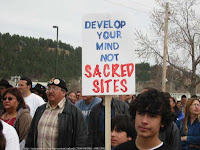




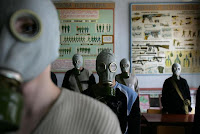









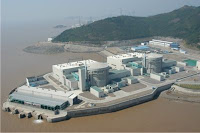
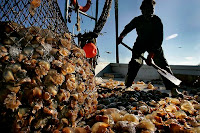



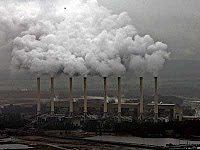

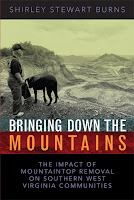
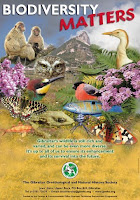




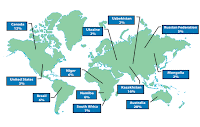





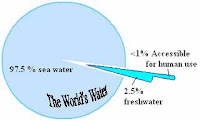








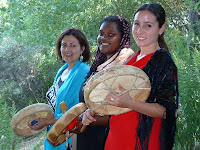










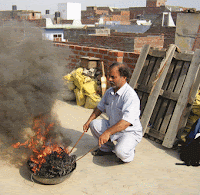
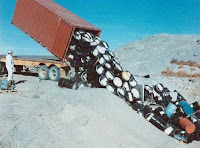











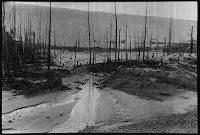



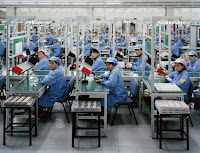






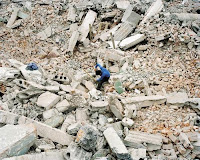

















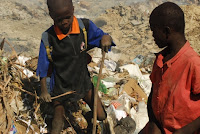

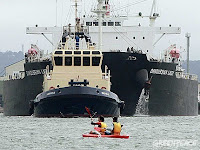


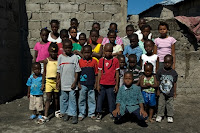









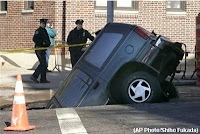
















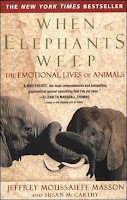













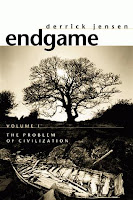




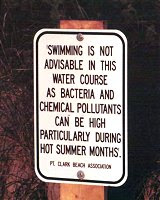








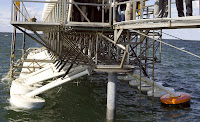











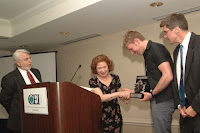





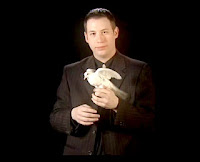










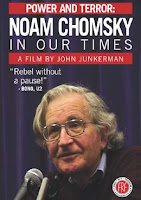
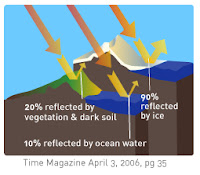






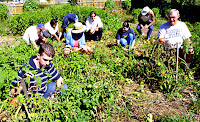
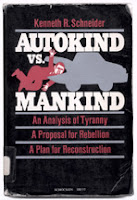


























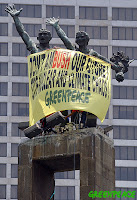












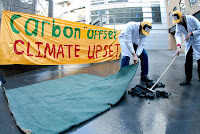





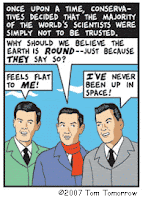


.jpg)


